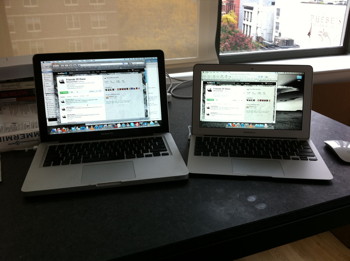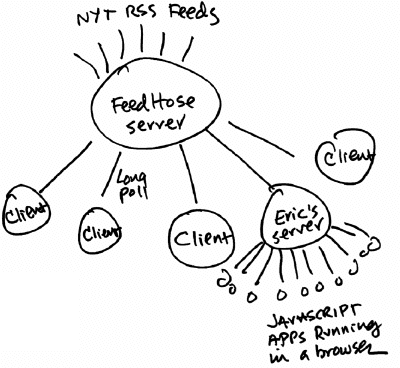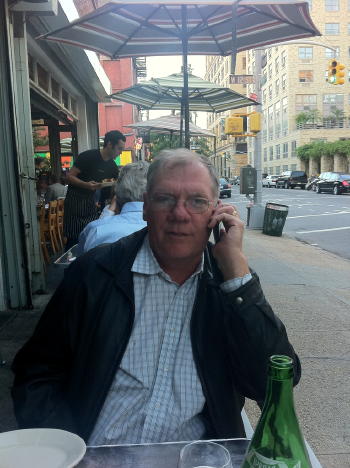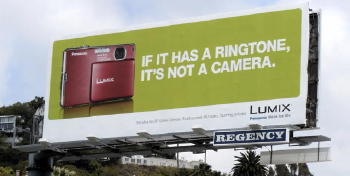
 Why the MacBook Air (11-inch version) is a win
Why the MacBook Air (11-inch version) is a win 
Okay, we've covered the negatives:
1. The ridiculously high price.
2. The missing features.
3. The hubris of Apple.
4. The wimps we've become.
Now here's the positive that makes it a keeper.
1. If you put it in your knapsack you won't notice it's there.
And...
2. It's a Mac.
3. You don't have to hack up a Hackintosh.
Extras...
4. The screen really is beautiful.
5. The keyboard feels nice. (Wish it was lit.)
Seriously, when I packed for my day trip to DC, and picked up the knapsack, with a Kindle, a change of clothes, my wire bag, headphones -- it didn't feel like I was going for a hike in the wildnerness.
Plus I've been getting comments from passers-by. Hey what is that little computer you're using. Not as many as the Asus would get, because this computer isn't quite as radical as it is. But it is a conversation-starter.
For $1300 it's worth it.
 How using labels like liberal or lefty labels *you*
How using labels like liberal or lefty labels *you* 
Today we're doing a special Rebooting The News, from Washington DC at the Online News Association meeting.
It will be carried live on Blogtalkradio, assuming everything works out. No matter what, we'll have an MP3 shortly after. And the conference may be webcasting it as well.
We have a lot of things to talk about. I want to be sure to talk about Chris Gulker's contribution to the bootstrap of blogging. I'm disappointed that no newspapers ran an obit for Chris, who died of cancer a couple of days ago. It would have been a nice gesture not only to his family, but it would show that they understand that blogging is part of their past, present and future. Guess we still have to wait for teh Cluetrain to make a stop in MSM-land.
I'm going to mention King Kaufman's expression about impartiality and objectivity in the press. I've never heard it said so well or concisely.
One more thing.
 I saw a comment on Twitter yesterday from a well-known pundit, gloating about how the "lefties" are going to be befuddled after the election. It was a really childish statement. Made politics seem like baseball, when as we know, elections have consequences. I read in the Times today that many economists think the US is deep in a hole very much like the one Japan has been in for 15 years. It's a hole that there's not much hope of getting out of, certainly not quickly. That's the difference between this and baseball. Baseball is a game (a great one -- go Giants!) and politics have consequences. It's not reallly a game.
I saw a comment on Twitter yesterday from a well-known pundit, gloating about how the "lefties" are going to be befuddled after the election. It was a really childish statement. Made politics seem like baseball, when as we know, elections have consequences. I read in the Times today that many economists think the US is deep in a hole very much like the one Japan has been in for 15 years. It's a hole that there's not much hope of getting out of, certainly not quickly. That's the difference between this and baseball. Baseball is a game (a great one -- go Giants!) and politics have consequences. It's not reallly a game.
I'm pretty sure Ruffini thinks I'm a lefty. Whatever that means.
I voted for Reagan and both Bushes. (Not proud of those things, btw, but it's time to confess.)
However I only voted for the second Bush once, and did not vote for McCain. Oh I guess I'm not really a rightie either.
A good libertarian would probably favor Prop 19. Rightie? But a member of the Christian Coalition (or whatever they call themselves these days) would hate it. Rightie? I bet there are a fair number of people who voted for McCain who smoke pot. Hey I wouldn't be surprised if McCain himself has smoked it. Pretty sure Bush did. ![]()
Problem with these labels is that they are disempowering and I don't accept the disempowerment. I don't vote as anyone tells me to. I make my own mind up, for better or worse.
I hate that we bailed out the banks and car companies. Does that make me a conservative or a liberal? Seriouslly, how can you tell? A liberal or leftie, as I understand it, would hate business and therefore would hate the bailouts. But a conservative says we should let the market take care of them. I know, I head them say it. So what's the diff? (I'll answer it myself -- none.)
Sometimes you have to do things you hate to do. I do it all the time. I had eye surgery a couple of weeks ago. Heart surgery eight years ago. I buried my father last year. What choice did I have? Does all that make me a leftie or a rightie? Because living in a complex society like ours, and it is complex whether you believe in Ayn Rand or not (I've read all her books, btw, when I was a teenager), means doing things you don't want to do. Did you want to be drafted in the war in Vietnam? Most people didn't. Did you want to pay taxes last year? If you didn't like it, does that make you a leftie or a rightie?
I've started two capitalist companies. RIghtie. But I provided health insurance to my employees. Leftie.
So my point is pretty simple, if you think there are righties and lefties, and you use those terms in your writing or speaking, I think you're saying something about yourself, and it isn't a very nice thing to say.
Update #1: Legalized Pot's Unlikely Supporters: Moms And Cops.
Update #2: Why conservatives should favor legalizing marijuana.
 Yes on Prop 19
Yes on Prop 19 
 I don't live in Calif, but I did for many years -- and one of the cool things about the state is that it leads the way in many social innovations. This year it has the chance to take the next big step in the ending of prohibition on marijuana.
I don't live in Calif, but I did for many years -- and one of the cool things about the state is that it leads the way in many social innovations. This year it has the chance to take the next big step in the ending of prohibition on marijuana.
According to Nate Silver, it's close -- within a single percentage point in polling earlier this month. But he also says polling in propositions is notoriously inaccurate, so no one knows.
Who would have thought in 2010 that marijuana would still be illegal. It should be taxed and regulated like alchohol and tobacco. Sure, in a perfect world no one would need drugs. Please let me know when we get there! ![]()
If you vote in California, please vote Yes on Prop 19, and encourage your friends and neighbors to get out there and vote for it too.
 First post from AiryBook
First post from AiryBook 
If I'm going to take this sucker on a road trip, I'd better be sure I can post something to my blog.
Here's a picture of the 13-inch MacBook Pro, next to the Airbook I'm typing this post on.
Click on the image above to see the full size image in Flickr.
 First few hours with the new AiryBook
First few hours with the new AiryBook 
My 11-inch MacBook Air is here.
These are just first impressions, off the top of my head, based on almost no use. If you're a Mac fanboy, save yourself some grief and don't read this piece. You won't understand it and you won't like it. If you ignore this warning don't complain to me! ![]()
1. There are tradeoffs.
2. The screen is seriously small. No Ethernet.
 3. If I'm seriously expected to think of this as a netbook, I really resent that it costs almost $1000 more than the last netbook I bought.
3. If I'm seriously expected to think of this as a netbook, I really resent that it costs almost $1000 more than the last netbook I bought.
3a. That netbook cost a lot less, but did a lot more. Longer battery life. Larger disk capacity. Three USB's not two. Ethernet. SD card slot. I know why we need all those things. All of them. Why does Apple think it can ship so much less and charge so much more and not force product comparisons? They're depending on the Reality Distortion Field keeping from people from being even slightly pragmatic in reviewing this product.
4. Haven't decided whether I should leave this guy hooked up to Dropbox. It's synching unbelievably slowly, over my fast FIOS connection. It says it'll be done in 59 days. Let's see where it is tomorrow morning.
5. I'm going to DC on Saturday, overnight. I will take the Air. Should I also take my iPad? (Probably will. But to be fair if I travelled with my 13-inch MacBook Pro, I would have brought the iPad as well.)
6. I'm thinking about returning it. Not sure if this is going to fit into my workflow.
7. iTunes still sucks.
8. The thing that really ticks me off is this -- why not, for all the extra money and missing basic features, push the envelope. That's what I used to like about Apple. They built in networking into every Mac in the 80s. It was something extra that the other guys didn't do, all to build a market. How about putting a Wimax modem in there. Make it a better netbook, instead of just taking features out and jacking up the price.
I guess basically, at this point, I'm not thrilled with this purchase. But that's a first impression. Don't trust it, I don't.
PS: I called it Hooterville. ![]()
PPS: If you're wondering why I bought this even though the specs are out there, and I "should have known" it was an overpriced ripoff before I bought it, I have two answers. 1. Please read my previous piece. It explains, carefully, how Apple and Amazon team up to get over those objections. 2. I watched Jobs roll it out (only the second time they've broadcast a SteveNote) and was told it had magical properties you could only understand by possessing one. He held it with reverence. Said it would make me a better human being. (At least implied that.)
PPPS: I want to outlaw Apple Fanboys the same way Apple is outlawing Flash.
 New York as a bike-riding Amsterdam
New York as a bike-riding Amsterdam 
Are the bike lanes in New York working?
Will bikes in New York ever become a safe and common mode of transport, as they are in Amsterdam?
Imho: Only if there are a lot more bikes in the bike lanes, all the time.
Because there are so few bikes on New York avenues, the lanes are being used for cars and pedestrians and conversations, which make them more or less useless for bikes.
Bottom-line: If we want bike lanes to work, more bikes have to use them.
 My East Side ride
My East Side ride 
Today's ride took me to the East River, up and down, but this isn't going to cut it as a regular trip.
First, the ride to the east is truly dangerous. In one place I was riding up a two-way street that was about to turn one way (the other way). A cab enters the street on the wrong side, headed straight for me. I had to ditch between two cars.
Anywhere that you have to share a narrow street with cars is really dangerous. The moving cars cut real close to you, leaving you no option but to ride real close to the parked cars. And there's nothing you can do if a door opens into your path. I hate that kind of riding.
Trucks routinely park in the bike lanes on the avenues. The only way around them is to pull into traffic or ride around them on the sidewalk. Which choice do you like better? ![]()
The actual riding on the bike paths, what little there is (compared to the west), is pretty good. But to the north there's a problem with the United Nations. They can't run a bike path through there, apparently. So the path just ends, with the UN in the distance, with the 59th St bridge beyond that. Today was a gorgeous day and a nice picture was possible.
Turning south, I went as far as the Williamsburg Bridge, again a very nice ride. I just wish there was more of it.
I like the west side so much better. And it's not really that much more of a schlep to get over there. So the next time I go out riding, I'll just head west.
The map for the day. 47 minutes. 6.65 miles.
 It's a wrap
It's a wrap 
On gulker.com, a headline we've been anticipating.
Chris has died, and it's covered, on his personal blog.
A natural-born-blogger, to the end.
Reminds me of a story...
I was at Dean HQ in Burlington, on the night of the Iowa primary and The Scream. I had the keys, I could post to the home page of the Dean blog, thanks to Nicco who I had just met who thought it was a fun idea to have me in the room, blogging for Dean on the big night. It felt hugely powerful. It might have been the most-watched place in the blogosphere that night.
They're projecting Larry King on a screen in the office where we all can see. The Candidate is on and he says is clearly and unambiguously. We lost Iowa. But we're still in it. On to New Hampshire!
So I open a new post and enter a title: We Lost Iowa (or somesuch). The body of the post quotes Governor Dean as I heard him on TV. Short and sweet. I posted it to the home page and kicked back with a satisfied feeling of a blogger who got the scoop.
As people in the office refresh the home page, a meeting convenes in a private office with the door shut, where it's decided that the post will come down. We only run positive news, it seems. But Dean, using his instinct for putting out the real story as soon as possible, to be the source of the bad news so people know we're still here, there will be a tomorrow, he understood that the blog should just acknowledge it.
So like it or not, it makes perfect sense for gulker.com report the end of Gulker. And like it or not, though we lost Chris, we're still here, there will be a tomorrow.
My two cents...
People play different roles in your life.
In mine, Chris Gulker was a teacher.
He taught me about web content management at a time when that's what I most needed to learn.
He's still teaching me
Thanks man!
PS: I'll seeya soon enough. ![]()
 My fairy friend
My fairy friend 
I am blessed with friends who love me, and who I love. Each for who they are, never trying to impose an ideal of mine on them. Like a lot of people, I did that when I was younger. Learned the lessons. Learned to appreciate people on their own terms.
NakedJen is one of those people. She calls herself a fairy. It fits. Once, on a trip to NY, we rode to Staten Island on a boat, for free. We stood at the front of the boat watching its intricate docking procedure. When we landed NakedJen was the first fairy off the ferry. This became our mantra for the day. First fairy off the ferry. First fairy off the ferry. First fairy off the ferry. First fairy off the ferry. ![]()
Anyway...
 My airy book
My airy book 
![]() This is how it goes with me and new Apple products.
This is how it goes with me and new Apple products.
First I go to the page on the Apple Store, and I go through all the configuration options. I get to the last screen where I have to say Go For It, and back out. Invariably it's the lack of instant gratification that does me in.
Then, if I'm really interested, I go to an Apple Store and check it out. That's where guilt comes in. I really don't need this. I already have too many xxx's where xxx could be mouse, keyboard, router, phone, laptop, desktop.
Then I go to the Amazon page for the product and that's where my resistance meets its match. I go to the page one time and stare. Read the reviews. Think about it. Think some more. Leave. Then a day (or hour) later I'm back, staring at the 1-click button at the top of the screen. If I just click the button, it will be here tomorrow. If I just click the button. If I just click the button. Yadda yadda.
Then the thought metamorphizes. You know you're going to give in at some point and click the button. If you click it right now you can enjoy the product tomorrow! Turns out that's just the right amount of instant gratification. Not so much that I have to feel the guilt now, that gets postponed a few hours. And by the time it arrives, the guilt has been replaced by acceptance.
This thing is going to be part of my repetoire now. Part of my chorus. My supporting cast. One of my fellow team members. Posse. If it's a computer or a router I'm thinking about its name. I'm thinking about what I'm going to do with the old version of whatever it is I'm buying. I'm getting good at mothballing these suckas.
Anyway, I write all this today because yesterday I went through the last two stages of the ritual on the new MacBook Air. I bought an 11-inch laptop (still not ready to call it a netbook), with 128GB of disk. I'm thinking of giving it an ironic name like Hooterville or Green Acres, because it's such a big city computer, so slick, might as well make light and give it the name of a bumpkin. Maybe Mr Haney or Arnold The Pig?
Ohhhh they've so got me trained to give them money.
 Post-eye-surgery bike ride
Post-eye-surgery bike ride 
After getting my minor eye surgery I've been feeling fragile, so I've avoided bike riding. But today it was just such a gorgeous day, and I was waiting for some software to update (a very slow process) so I said this is the day -- and out I went.
I didn't realize how good I had it on the west side, because every trip on the east side, it seems begins with a cross-town ride, in traffic, to get to the west side. Not a good place to feel shaky, but that's how I started this ride. Once I got on the Hudson River bike path, I was back on familiar turf. Repeating the mantra, I am not the fastest rider, but I am the safest. Lots of interesting sights to see, and an otherwise uneventful 10.7 mile ride.
The turnaround picture showed what a gorgeous day it is here in NY.
The long delay was at Hudson Urban Bikes on Charles St to filll my rear tire which was very low.
 Master narratives of Rebooting the News
Master narratives of Rebooting the News 
Listen to the show live, and post a comment here if you want to add a master narrative to the list.
I'm also going to monitor Twitter, so use the tag #RBTN to post something to my attention.
We're already using the rebooted system of news.
Every node in the network is a participant in the system.
The sources go direct.
It's easier to trust "Here's where I'm coming from" than the View From Nowhere.
Efficiency is creativity.
The enemy of progress is complexity.
Checkbox News.
King Kaufman: "Objectivity and impartiality are journalism's version of 'don't ask, don't tell.'"
If you hear fire trucks in the night, in the morning you should be able to find out where the fire was.
People come back to places that send them away.
Narrate your work.
We make shitty software.
 Readings for Jay's class, week 2
Readings for Jay's class, week 2 
I'm going to Jay Rosen's class this afternoon, after participating in a very interesting discussion last Monday.
He writes:This week, we are broadening the lens to include bloggers, critics and students of the Net discussing [the disruption] of the business model for news, the collapse of the newspaper industry (by far the biggest employer of journalists) and the rise of a new system for producing and delivering news."
1. Jeff Jarvis, The Last Presses, at his blog, Buzzmachine (Dec. 5, 2005).
2. Eric Alterman, Out of Print: The death and life of the American newspaper, article in The New Yorker, (March 31, 2008).
3. Nick Carr, The Great Unbundling: Newspapers & the Net, Britannica Blog (April 7, 2008).
4. Lisa Williams, Journalism will Survive the Death of its Institutions, IdeaLab blog. (April 15, 2008).
5. Clay Shirky, Newspapers and Thinking the Unthinkable, at his blog. (March 13, 2009).
6. Steven Berlin Johnson, Old Growth Media and the Future of News, at his blog. (March 14, 2009).
7. Dan Conover, 2020 vision: What's next for news, at his blog, Xark. (March 20, 2009).
8. Dave Winer, The reboot of journalism, at his blog Scripting News (March 19, 2009).
9. Amanda Michel, Get off the Bus: The future of pro-am journalism. Columbia Journalism Review, (March/ April 2009).
10. Doc Searls, After the Advertising Bubble Bursts, at his blog (March 23, 2009).
11. Susannah Breslin, The numbers on self-publishing long form journalism, at her blog (Oct. 19, 2010).
 A tale of two phones
A tale of two phones 
 I'm giving a phone to a friend who needs one.
I'm giving a phone to a friend who needs one.
I have a Nexus One and an iPhone 3G in the drawer, both ready to be adopted, or so I thought.
Their batteries were completely empty, so I charged both phones. When the iPhone came up, it offered to update its software. Foolishly, I said yes. That failed. It said I had to restore the phone, so I did. Failed. Now I have a $300 brick. Now that's my phone, why shouldn't I be able to give it to someone else? And when I give it to them, isn't it reasonable to want to remove all my accounts, passwords, apps, email, bookmarks, etc?
The Nexus One fared much better. It charged up, said it had no SIM, but it worked anyway. Email worked, maps worked, search, you name it. Everything but the phone. Then I did a search to find out how to wipe it. Went to Settings, then Privacy, and said I wanted to wipe the phone. It asked if I was sure, explaining that all my data would go away, and my apps, and I'd have to re-enter my google.com credentials. Perfect, that's exactly what I want.
A few seconds later the phone reboots, and I'm greeted with this screen.
I guess my friend is getting the Android phone. (It's a better fit anyway, she's kind of a hacker, experimenter, Williamsburger).
Over on Twitter, I linked to a story quoting Melinda Gates saying she will not let Apple products into her home, even though her children want them. Jeff Jarvis commented: "Funny thing is, it's easier to outlaw Apple products than MS products, isn't it?"
Next question: Where to get a SIM to pop into the Nexus (or for that matter the iPhone, should it start working again). Looking for something inexpensive, preferrably without a commitment.
Update: Based on feedback from readers, I tried restoring the iPhone again, and it failed. However the third attempt worked. So the iPhone is now ready to be provisioned as a new phone. That said, the Nexus still has a big advantage. It can be used as a wifi-only device. If the iPhone can (effectively turning it into an iPad Touch), it's not at all obvious how to do it. My only two choices are to activate it, or restore it from a backup of myPhone. And I'm really nervous about hooking my iPhone 4 up to this computer. Maybe it'll synch up with the July version of itself, which is what is now backed up on this computer's hard disk. I've gotten hosed by iPhones many times doing something like that.
Update #2: Arikia posted a follow-up after receiving the phone.
 Amazingly, the OPML Editor now does JSON
Amazingly, the OPML Editor now does JSON 
I still think JSON was a bad idea, that we should have worked harder, all of us, to make a single simple text-based data sharing language. And, if you ever doubted my sincerity, you can believe it now because I now have done the work to make my programming environment able to both send and receive JSON.
A couple of weeks ago, as part of the FeedHose project, I made it so that it could transmit JSON.
And over the last few days I've written a JSON parser.
For those people who are familiar with Frontier (the OPML Editor is just a distribution of Frontier, which was GPL'd in 2005), the JSON support is designed to work with the internals that have already been built around XML. There are two main routines for that, xml.compile and xml.decompile. There are two new routines, xml.jsonToTable and xml.tableToJson, that work exactly as the equivalent XML routines. They produce the same structures, so that all the techniques we have for walking structures work whether the data came to us through JSON or XML.
I've put up a web app for testing the JSON support in the OPML Editor. If you want to help, find bits of valid JSON that it doesn't correctly deal with. And find invalid JSON that it accepts.
 Amazingly, a killer app of OSes is possible
Amazingly, a killer app of OSes is possible 
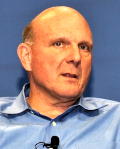 Steve Ballmer is being widely quoted as saying that the next version of Windows will be the riskiest bet Microsoft has ever made. That's a pretty strong statement from a company that has made some big bets over the years.
Steve Ballmer is being widely quoted as saying that the next version of Windows will be the riskiest bet Microsoft has ever made. That's a pretty strong statement from a company that has made some big bets over the years.
My first reaction is "Sure, yeah whatever you say Steve" (with my eyes rolling). But then I thought about it, and surprised myself with the idea that yes, there is a big bet that they could make, and it could pay out big. The only questions are: 1. Does Microsoft see it? (Seems doubtful.) 2. Even if they do, can they execute? (Seems more likely.)
First let's start with a few assumptions.
1. It's 2012.
2. We love storing our data in the cloud because it's always available no matter where we are, no matter what computer we're using, whether it's a mobile device, laptop, desktop, tablet, or whatever. What's making it possible for all these different form factors to co-exist is the cloud, and the fact that we no longer have to synch data between devices, they all can access the only copy of all the data, the one in the cloud.
3. As computer professionals we know it's not wise to put all our data on someone else's servers. Perhaps users don't know that, but by 2012 perhaps some will. All it takes is one major outage on Google's servers, or Apple's, or Amazon's -- to spread the word that even though cloud computing is wonderful, and has huge advantages, it also has pitfalls.
Okay so that's the future context. Now, imagine you're running Microsoft. What are your strengths and assets? What makes you unique?
1. The OEM business. Apple always goes it alone, Google is just getting started with OEMs. Microsoft has OEMing in its DNA, for decades.
2. A familiar user interface. Whether you like it or not, there are a billion people who, more or less, know how to use Windows.
3. Lots of apps. Not as big a strength as it once was, but still substantial. And with Apple closing its channel more and more, Microsoft has the possibility to zig to their zag, and make their channel even more open to entrepreneurship. And they aren't starting from anywhere near zero.
4. They already have a version of Windows you can install on a server running in the cloud on Amazon EC2 or Rackspace. So they have a strong start at Windows as a cloud-based OS.
Okay, now what is Windows 8?
It's less than Windows 7. The UI is simpler. The media players are out. Its job is just to let your data have a place to live that you own, that you pay for, that you fully control. I would actually cut a direct deal with Amazon and create the ultimate cloud server that a user can manage themselves, that you pay for by the month. Need more services? Pay a little more. Need even more? Pay even more. ![]()
Now this would have to be promoted very crisply. With lots of influential individual developers non-disclosed and on-board long before it's announced. But because the basic softrware already exists, on Rackspace and EC2, you can start the bootstrap right away.
You also produce a simple, beautiful client that runs on netbook hardware, and runs on every other platform you can get software on. Go ahead and develop iPhone and iPad apps. Let Apple reject them, and when they do, make it public issue. Hell, make it a public policy issue. (BTW, I would partner with Facebook on this. Let Joe Hewitt run the project. Don't know who he is? Find out.)
Bottom-line: a really simple, user-administered, cloud OS is the next killer.
Now for the analysis...
Microsoft has gotten so boring. And it's not enough to say you're taking a big risk with Windows, you have to actually inspire people with a vision. It's not the risk that's important, it's the inspiration. Think about the commercial Apple ran when they re-introduced the company in 1997.
Now, back to the beginning -- do I think this is likely what they're doing? I don't. I think in all likelihood Ballmer has seen demos that impress him, but they are the old dogs and ponies they've shown many times before. Guys like Ballmer go for eye candy, just like most VCs and a lot of reporters. But they don't make good company-scale bets. Why do I think this is what they're doing? Well, because I don't think Ballmer has tech in his blood. He's a salesman. And one more thing -- Ray Ozzie just left. If they were doing something smart and bold, I doubt Ray would have gone.
If they went for it, would it be easy? Yes, actually it would, and that's the problem. Microsoft wouldn't need most of the OS engineers they employ. So you can bet that no matter what the user experience is, they will be rewriting major portions of the OS in this new release. Because that's what their engineers know how to do.
 Rule 1 of local blogs
Rule 1 of local blogs 
Rule #1 of local blogging: If you hear fire trucks in the night, in the morning you should be able to find out where the fire was.
Hat-tip to EV Grieve, an East Village blog, that very often has the story.
 King nails it
King nails it 
King Kaufman: "Objectivity and impartiality are journalism's version of 'don't ask, don't tell.'"
 The Juan Williams controversy
The Juan Williams controversy 
Here's what happened.
Juan Williams was a longtime analyst for NPR. I always thought he was pretty liberal, but then also shows up on Fox News. When he's on Fox, it's as if he's a different person. Very odd.
He said something on Fox that caused NPR to fire him.
What he said is this. When he sees someone dressed in Muslim clothes (whatever that means) on an airplane, he is scared.
Is this a bad thing that 1. He has this fear. 2. He expressed it in public. 3. At the same time as #1 and #2 he is an analyst for NPR.
It seems that this is more than a faceoff between left and right, which is how it is being portrayed, predictably, in discourse on radio and TV.
In the blogging world there is a rough consensus (heh) that it's better to know where someone is coming from, than pretend that they're expressing an impossible "view from nowhere." (Aside to Jay, this is one of the recurring themes on RBTN.)
 NPR says there's nothing wrong with fear, but Williams should talk with his shrink about it, not air his fears in public. They rightly believe his point of view is unfair to Muslims, who are doing nothing wrong by wearing religious clothes when traveling. To see their point, imagine someone said the same thing about Catholics. Would we seriously suggest openly and publicly that a priest should not wear his religious clothes when traveling? Even if it does scare some people (no doubt it does).
NPR says there's nothing wrong with fear, but Williams should talk with his shrink about it, not air his fears in public. They rightly believe his point of view is unfair to Muslims, who are doing nothing wrong by wearing religious clothes when traveling. To see their point, imagine someone said the same thing about Catholics. Would we seriously suggest openly and publicly that a priest should not wear his religious clothes when traveling? Even if it does scare some people (no doubt it does).
It's obvious there are at least two valid points of view on even this issue!
My own opinion: I prefer if people express fears publicly, because this gives them a chance to be discussed. The attitudes exist, no arguing with that. As they say sunlight is the best disinfectant. The harm is in pushing it aside, not in discussing it.
Regardless, a discussion could not be avoided, once the words were uttered in public on Fox.
Update: Wouldn't it be cool if NPR issued a mea culpa. Apologized to its listeners and to Mr. Williams and invited him to come back. It would be absolutely unprecedented, but also very very appropriate to the times we live in and the future we will live in.
 New blogging techniques
New blogging techniques 
What I call paragraph-level permalinks have made an appearance in Jay Rosen's blog, thanks to the innovative design work of Lauren Rabaino.
Nieman Lab calls out the feature.
And this got a geek going, Daniel Bachhuber, whose new (today) WordPress plug-in implements what he calls WinerLinks, which of course is my last name. Hey nice to get credit for the feature. ![]()
Haven't had a chance to use the plug-in yet, but I'd like to.
 The link to a paragraph shouldn't break even if the author adds or deletes a paragraph above. Not sure how you'd do this in a browser-based editor such as WordPress. My implementation is easier because I use an outliner to edit blog posts, and each paragraph has invisible attributes that move with the paragraph no matter how the document is ordered or organized. In other words, paragraph numbers are an edit-time variable, not a render-time variable.
The link to a paragraph shouldn't break even if the author adds or deletes a paragraph above. Not sure how you'd do this in a browser-based editor such as WordPress. My implementation is easier because I use an outliner to edit blog posts, and each paragraph has invisible attributes that move with the paragraph no matter how the document is ordered or organized. In other words, paragraph numbers are an edit-time variable, not a render-time variable.
Another feature people should look at implementing in WordPress is sub-text. It allows the author to add parenthetical ideas that are revealed when the reader clicks a little plus sign in the left margin. You can nest these as many levels as you like.
Without an outliner to edit the text, and without the ability to store OPML source text in the WordPress database, I have no idea how you'd implement this, but I'm not a plug-in developer, and have no thoughts of becoming one.
If people want to discuss how to do this here, please go ahead, and if you have questions for me, I'll try to answer them.
Hey it's been a long time since there's been interest in new blogging features. I have lots more where those came from, so we could get this ball moving again, if there's an interest.
 Will the Mac remain an open platform?
Will the Mac remain an open platform? 
There's always a lot of debate about what "open" means, so let me say what I mean by open in this context.
A story to illustrate.
Right now I'm sitting in Starbucks on Astor Place in NYC. I'm looking at the entrance to a NYC subway station. Every minute a hundred people walk down the stairs to pass through a turnstile where they pay a fare. They wait for a train, get on it. It takes them somewhere. Once there, they reverse the process (except they don't get their money back).
There's no Apple employee at any of the entrances, deciding if they are dressed well enough to get on the subway. There isn't anyone there to be sure you aren't carrying a virus that you could give to everyone you come in contact with on the subway.
It's in that sense that the Mac is, today, an open platform.
I can install whatever I want on it. No one can tell me what I can and can't.
I know intuitively that we took the next step yesterday toward the day when the Mac is not an open platform in this sense. I'm not going to say it's right or wrong, or a betrayal of trust, or make any moral judgements. I'm not even going to say it's not wise, for all I know it's the best business decision Apple could make.
But for me, it sucks. Makes me sad.
If there's nothing to worry about I wish Apple would say "there's nothing to worry about, the Mac will always remain the kind of platform where you can run anything you want."
On the other hand, it would be smart for Microsoft to find a way to say that Windows will never be a locked platform, that they will never try to dictate who can and can't ship software for it. Seems like a small concession for a company that's operating under an antitrust settlement that prohibits it from erecting barriers to entry to the Windows platform. (And at some point, if Apple isn't very careful, they're going to end up being supervised the same way Microsoft is.)
I depend on the Mac for my work, and I don't see Apple approving my software, nor do I see myself applying for their approval.
Update: Rafe Colburn thinks the Mac will not become a gated platform.
 Writing during a crazy week
Writing during a crazy week 
This last week has been crazy here. First I moved, then I had eye surgery. Even so, I wrote three pieces, with three significant ideas that are interesting enough to call out separately in a follow-up piece (this one).
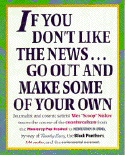 1. Readings from news execs. When we look at the predicament the journalism industry finds itself in, we all overlook the elephant in the room, what if it's possible to create something very much like the journalism we have now, but with reporters who earn their living doing something other than commercial reporting.
1. Readings from news execs. When we look at the predicament the journalism industry finds itself in, we all overlook the elephant in the room, what if it's possible to create something very much like the journalism we have now, but with reporters who earn their living doing something other than commercial reporting.
There is prior art: 1. Wikipedia and 2. software. In both cases, an activity that used to pay no longer does. In both cases we made the transition. We have a better encyclopedia that is accessible to everyone all the time, and is constantly expanding. And we are creating more software than ever, and employing more programmers, yet we no longer charge for software, or if we do, we charge very little compared to what we used to.
So yes, it is conceivable that you could get your journalism without paying for it. Now let's see how that might work. Let's at least discuss it. If it hurts the feelings of editors and reporters, so be it.
2. Why FIOS is important. The tech future is created by people who live with its limits. And when the limits are expanded for large numbers of users, you'll get new stuff. Innovation. The connectivity in homes in eastern US cities is substantially better than in the west. This isn't factored into most people's thinking when they consider advantages one area might have over the other. Symmetric connectivity allows people to operate small scale servers in their homes for no additional cost.
3. Complexity is the enemy of progress. A continuation of the series about doing open development work. This piece is one of the best-received I've ever written.
Starting tomorrow I'm hoping for a quieter existence with slightly less upheaval. ![]()
 Random afternoon notes
Random afternoon notes 
I had minor eye surgery this morning, to remove a cataract on my left eye. They replace the lens of the eye with an implant. It's supposed to make your vision nearly perfect. Looking forward to that, because I've been virtually without sight in my left eye for a couple of years. Right now I have a big ugly patch on the eye, but it comes off tomorrow. I'll let you know how it goes.
As reported yesterday, I had FIOS installed, and so far so good. It's the most bandwidth I've had into my home and home workplace, ever. I had a T1 line in the mid-late 90s. But this is a much bigger pipe than a T1.
 I also bought a relatively high-end cable TV package, hoping to connect that to the new Mac Mini I purchased for this LAN. Another learning opportunity. So far all the recommendations have been for EyeTV HD. It works like a SlingBox, if you're familiar with that. You get a cable that emulates an optical remote control. You paste it to the top of your set top box, and then use the EyeTV software to change channels.
I also bought a relatively high-end cable TV package, hoping to connect that to the new Mac Mini I purchased for this LAN. Another learning opportunity. So far all the recommendations have been for EyeTV HD. It works like a SlingBox, if you're familiar with that. You get a cable that emulates an optical remote control. You paste it to the top of your set top box, and then use the EyeTV software to change channels.
I can't stand the thought of using the crazy channel guide they have in the box. Or have to swtich both the audio and video every time I want to check my email or tweet something while a show is running. I've totally gotten spoiled by having everything flow through the desktop.
Do you find that network installers hate to leave when the job is done? It always goes the same way at my house. When they walk in, they're bored and don't say much. When they finally see how my system is hooked up, they realize that I've got the nirvana they dream of. Yesterday I showed the cable guy how my receiver has a built-in HTTP server. The poor guy was blown away. It made complete sense to him, but his company is apparently far away from offering anyting like this.
This experience with Verizon may be different from my experience with Comcast in Berkeley. I hope so. In Berkeley, I was working on a photo aggregator, and used a ton of bandwidth testing it on five different boxes simultaneously. I never did the math to see how 1000 pictures per day at about a megabyte per, times five computers, could add up to some significant bandwidth (actually it doesn't seem like that much, about 30GB per month). My bandwidth use was enough to put me in the top 1 percent of their customers, and was enough to get them to fire me. Seems kind of senseless to fire your biggest users without at least trying to find out what they're doing.
They were just beginning to make the connection through Twitter that maybe I was honorable, and maybe it might be worth it to have me developing products using their technology. But one end of the company was too far away from the other to make the connection and it blew up.
I've been trying to get onto Verizon's network for a couple of years. Honestly it was part of the reason I moved east, I got the sense that Berkeley and most of the Bay Area was stuck in Comcast hell, and AT&T's mediocrity, and there was no political will to do anything about it. Somehow NYC and a few other east coast cities have managed to get symmetric connectivity to at least some of their citizens.
People don't think about connectivity when they think about booting up a tech culture. But I remember how the Apple II bloomed. The best software was made by people who had one computer, their own personal Apple II. If you saturate a geography with symmetric connectivity, who cares what the rent in Manhattan is. You can live out in the country. What matters, to me, is that gifted programmers just have to scrape up an old PC or Mac to be a server, and any one of them can solve part of the distributed networking problem that intuitively many of us know we have to solve.
The future of technology is in the hands of people who live with its limits. And if you relax the limits for a large number of people, that's when new ideas bloom. The Apple II was like that. All of a sudden the power of a minicomputer could be put on almost anyone's desktop. I made that transition myself, from programming in a university on expensive hardware that was purchased by the DOD, to programming in my living room on my own computer, in a matter of a few years. So did quite a few others, and that's where all the big products and companies of the next generation came from. I'm sure that's how it'll happen again.
 Steve Jobs reads a speech about Android
Steve Jobs reads a speech about Android 
Here's the speech, part of a corporate conference call today.
It's all about Android, but consider the possibility that it's also about burying Microsoft once and for all.
If all everyone talks about is the rivalry between Android and Apple, where does that leave Microsoft and it's renewed aspiration in mobile devices?
 FIOS
FIOS 
Had FIOS installed in the new apartment today.
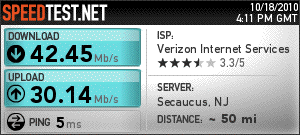
Verizon lists cities in California where FIOS is "potentially available." No clue what that means.
 Readings from news execs
Readings from news execs 
Preparing for Jay Rosen's class today, I, like all the students, had to read eight speeches given by news execs.
It was a really depressing task. I guess that's the point. Unless I was required to read them, I would have given up on each long before the end. The story is just too sad, and the rationalizations too weak, and honestly, way too vain and self-centered.
 There was an interesting juxtaposition. Rupert Murdoch giving a mercifully short speech saying the biggest mistake someone in the news business could make is thinking the reader is stupid. He could easily have been introducing the next speaker, Bill Keller of the NY Times, who clearly thinks almost everyone who doesn't work at the NY Times is stupid. It seems he would exempt reporters at The Guardian, the LA Times and the Chicago Tribune. Probably the Boston Globe as well. Not sure who else he respects, but he certainly doesn't respect bloggers, or seem to understand that bloggers could have facts or perspectives that a Times reporter might cite (though, thankfully quite a few Times reporters seem to do that these days).
There was an interesting juxtaposition. Rupert Murdoch giving a mercifully short speech saying the biggest mistake someone in the news business could make is thinking the reader is stupid. He could easily have been introducing the next speaker, Bill Keller of the NY Times, who clearly thinks almost everyone who doesn't work at the NY Times is stupid. It seems he would exempt reporters at The Guardian, the LA Times and the Chicago Tribune. Probably the Boston Globe as well. Not sure who else he respects, but he certainly doesn't respect bloggers, or seem to understand that bloggers could have facts or perspectives that a Times reporter might cite (though, thankfully quite a few Times reporters seem to do that these days).
For Jay's class, our assignment is to figure out how these guys are trying to adapt.
Here's how I visualize how they're doing it. Imagine a box made of cardboard. It's big, but it's light. Pick the box up and move it from one place to another. When it gets to the new spot, it's still a big cardboard box. It still can contain the same stuff as the box did when it was in the old place.
That's the transition each of these execs feel they have to make. The stuff in the box are news stories. The box is their editorial structure. The old place is print. The new place is the Internet.
I, of course, don't think that's it. Not at all.
Anyway, as I was reading these eight essays, my mind wandered -- and I wondered how each of these execs would explain Wikipedia. How is it that something that is very competitive with the product created by people more or less like them, was created by volunteers, people working for nothing?
Because the fundamental thing each of the speakers has in common, the one possible mistake they're all making, the one variable they refuse to consider is the possibility that other people might do what they do, for no pay.
Bill Keller said it most concisely. "newspapers have at least two important assets that none of the digital newcomers even pretend to match. One is that we deploy worldwide a corps of trained, skilled reporters to witness events and help our readers understand them. This work is expensive, laborious, sometimes unpopular, and occasionally perilous."
The key word in that paragraph is "witness."
They pay people to witness.
These events they pay people to witness are witnessed by many more people who aren't being paid. Could at least a few of them relate what they witness? And isn't aggregating all these witness accounts what reporters actually do? The faulty assumption that bloggers would be helpless without reporters ignores the fact that reporters would be helpless without accounts of witnesses who are not reporters (and might even be bloggers).
And of course, all this expensive witnessing is what they've been cutting. The Boston Globe used to have overseas offices, but was forced to close them to maintain their coverage of local news. They have also been using paid bloggers to cover many of the 200 towns in their area. Did it occur to them to simply start new publications in each of those towns, and let people do the witnessing on a voluntary basis?
If you think it's not possible to have a quality result, then you have to explain why Wikipedia exists, and why a similar approach could not be used for news. This question kept coming up repeatedly as I read each of the speeches.
The eight speeches:
1. Tom Curley, President and CEO, The Associated Press, speech to the Online News Association Conference, Nov. 12, 2004
2. Rupert Murdoch, CEO of News Corp., speech to the American Society of Newspaper Editors, April 13, 2005
3. Bill Keller, Executive Editor of the New York Times, Hugo Young lecture, Chatham House, London, November 28, 2007 07.23 GMT
4. Martin Baron, Editor of The Boston Globe, the 2009 Ruhl Lecture, University of Oregon School of Journalism and Communication, April 2, 2009
5. David Schlesinger, Editor-in-Chief Reuters News, speech to the International Olympics Committee Press Commission, June 23, 2009
6. John Temple, formerly Editor of the Rocky Mountain News, speech to the UC Berkeley Media Technology Summit at Google in Silicon Valley, Sep. 30, 2009
7. Alan Rusbridger, Editor of The Guardian, Hugh Cudlipp lecture, Chatham House, London, January 25, 2010
8. Vivian Schiller, CEO of NPR, speech to the Investigative Reporters and Editors, June 14th, 2010
 Marc Canter was right
Marc Canter was right 
I've known Marc for many many years, and this isn't the first time I've realized how right he was, and how early. There's some glory in being too early, but not much money (unless you file a patent and it sticks and you're not more than 17 years too early).
The idea was this: Social network software should be a commodity.
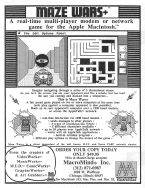 His product was called PeopleAggregator. A very accurate but slightly frightening name. The premise was this: Every virtual place should define a social network. It should be as easy to start a social network as it is to install an email server, or a web server. And someday it will be. Marc's someday is actually in the past. He had that product a number of years ago. He was able to extrapolate to a future that we're now right on the cusp of. Who knows when it will actually be realized? Sometimes thse things take an excruciating amount of time.
His product was called PeopleAggregator. A very accurate but slightly frightening name. The premise was this: Every virtual place should define a social network. It should be as easy to start a social network as it is to install an email server, or a web server. And someday it will be. Marc's someday is actually in the past. He had that product a number of years ago. He was able to extrapolate to a future that we're now right on the cusp of. Who knows when it will actually be realized? Sometimes thse things take an excruciating amount of time.
Examples of virtual places that will be the start of social networks: NYU, Starbucks, BestBuy, my apartment building, Dunkin Donuts, Logan Airport, Verizon, Netflix, The Godfather, Five Easy Pieces, Dirty Harry, Casablanca, Fifth Avenue, Vail.
In a university, the roles you can play are: student, teacher, administrator, security guard, teaching assistant.
In the Godfather, you can play a consigliere, the youngest son, a farmer in Sicily. A spinoff, The Sopranos, has all the roles from the Godfather, with a few more, updated roles. In an object-oriented world, it inherits the properties of its parent class.
You get the idea. Every place that defines a clear set of roles is a place that can host a social network that means something to some people. Facebook and Farmville hint at the beginnings of this idea.
This is on my mind today because I just moved, and had to change my address at all the sites that I have accounts at. The two phone companies I use. My credit cards and banks. Etc.
I'm not sure I want every one of them to define a social network, but certainly AT&T and Verizon, if they had the kind of vision that a Zuck or Ev had, would have started one by now. Of course they don't have the vision. But soon they will. And who will provide them the "off-the-shelf-solution" that makes installing a social network easy, predictable and reliable.
Anyway, I just wanted to give the hat-tip to my under-appreciated friend.
![]()
PS: Marc is a bona fide visionary, but he puts too much faith in Google. I predict they will break his heart, like a Cupertino-based fruit company did once, very long ago. :-(
 A blogger's store in NYC?
A blogger's store in NYC? 
 Every time I pass an empty storefront this nagging idea keeps coming up, so I thought I'd better write a blog post to get it out of my system.
Every time I pass an empty storefront this nagging idea keeps coming up, so I thought I'd better write a blog post to get it out of my system.
Let's talk about what I call a blogger's store. It's a place where bloggers visiting NYC can hang out and meet with other bloggers, from NYC and elsewhere, while they're visiting town.
Think of it this way. When an author comes out with a new book they show up at book stores all around the country to read passages from the book out loud and to sign people's copies. This is the same idea, applied to blogging, which is a kind of writing after all, but different.
I know the usual problem is how do you keep the quality up. That seems so much in the eye of the beholder. I guess there would have to be a curator, a sort of editor-in-chief who puts together the program.
One thing is for sure, whenever we come up with a way to make the blogosphere show up in realspace, something interesting happens.
PS: The idea would work elsewhere, of course, but I think of NYC because I live there, and it's also the biggest city in the US. ![]()
 The enemy of progress is complexity
The enemy of progress is complexity 
I've written two posts so far about how to do open development work.
The first piece set forth two rules: 1. All meetings must be open and 2. Ratify defacto standards if all posible.
The second piece explained how to use open formats, introducing three rules: 3. If it hurts when you do it, stop doing it. 4. Shut up and eat your vegetables. 5. Assume people have common sense.
In this piece, I introduce a new rule: 6. Design and document only your wire format, do not depend on toolkits to hide the complexity.
First a little background... In what we may come to look at as the golden age of the web, you could always do a View Source on a page and see how it was put together. HTML, back then, was simple enough so that even a technical neophyte could figure it out, if they had the IQ and tenacity. You didn't need years of experience programming to figure it out. This was important! It's what made it possible for the web to grow like weed.
 When I was coming up as a programmer in the 1970s, you needed a lot of experience to work in the world of minis and mainframes. The programmers of the previous generation felt secure that in order to make real software you had to understand all that they understood, which assured them a place at the top of the ladder, and made young dudes like me start out at the bottom. Heh. This is always a mistake. If you've created too complex a world, the next generation will just create a new one that's simpler. One that they understand and you don't. You're still at the top of a ladder -- your ladder. They just created a new one, and you're not even on it.
When I was coming up as a programmer in the 1970s, you needed a lot of experience to work in the world of minis and mainframes. The programmers of the previous generation felt secure that in order to make real software you had to understand all that they understood, which assured them a place at the top of the ladder, and made young dudes like me start out at the bottom. Heh. This is always a mistake. If you've created too complex a world, the next generation will just create a new one that's simpler. One that they understand and you don't. You're still at the top of a ladder -- your ladder. They just created a new one, and you're not even on it. ![]()
This was the danger, by the way, of making XML too complicated. With all the WS's that Microsoft, Sun and IBM added (and a dozen other smaller companies). I lobbied hard against it, you can find it all here in the archive on scripting.com, but they went ahead. And that begat JSON, which is simpler than XML mostly in that it doesn't (yet) have all that cruft. But if you want to do something real with JSON, there are a lot of services to master, and more all the time.
The enemy of progress in tech is complexity. The more unnecessary complexity that's added (and the WS layer on XML is a perfect example of unnecessary-ness) the sooner new development will stop, as the incentives to reinvent go up.
One way groups try to side-step creeping complexity is to create toolkits that hide it behind APIs. They implement the toolkits for the top five development environments (or six or seven, some but not all). They reason that this catches most of the developers. Maybe it does. But maybe the next layer is going to come from a language you never heard of. For example, the minicomputer guys, if they ever heard of Unix, probably thought of it as a toy operating system. They wouldn't have made a toolkit for that platform. Yet it was one of the primary successors. In other words, if you're the guy grappling with complexity, your head is probably too deeply buried in the ways of the past to see the future coming. You're going to leave out the guys you most need to not leave out.
Another reason the no-toolkits approach is important is that it puts your dirty laundry out there for everyone to see. If you have any pride, you may want to clean it up and simplify before you show it to the world. Somehow, seeing it through other people's eyes gives you a perspective that makes simplifications visible when they weren't before. Every bit of complexity that's left in will give some future programmer an incentive to reinvent your ass.
Don't get me wrong -- it's good to have toolkits. They should be listed on the site. But the primary documentation must be written for developers who are programming right on the wire, without any toolkits in the way.
PS: Hat-tip to Joel Spolsky's Architecture Astronauts.
 Zuck's bluff
Zuck's bluff 
I'm putting together my LAN at the new place, bit by bit. I have more space here, but much less than I had in Berkeley. It's an interesting opportunity to get my office and entertainment center all in the same room, networked, yet separate. They couldn't be in the same place in the last apartment, the rooms were too small. And it never occurred to me to put them in the same room in Berkeley cause I had umpteen rooms to play with.
As an example of what's possible, I want to use the entertainment center sound system for my computer and for watching TV. Should be possible because the receiver has a built-in HTTP server, and a website that allows you to operate the receiver.
When I got the desktop working Saturday afternoon, I looked around and found that Zuck had just started speaking at a startup conference in Calif, so I tuned it in on Justin.TV. The first thing I heard him say was that it was simpler when he started Facebook. All he had to do was make a website. Today if you want to compete, you have to cover all the mobile platforms, iPhone, Android, etc etc ad nauseum.
 It makes me sick to hear him say this cause it's the same old shit they always say and it's always wrong. Let's hope for Zuck's sake he knows it's wrong. To the startup guys, if you believe what he's saying you should go work for him, because it takes guts and creative thinking and the ability to spot a bluff, to make it in the business world. And he sure is bluffing.
It makes me sick to hear him say this cause it's the same old shit they always say and it's always wrong. Let's hope for Zuck's sake he knows it's wrong. To the startup guys, if you believe what he's saying you should go work for him, because it takes guts and creative thinking and the ability to spot a bluff, to make it in the business world. And he sure is bluffing.
Having to cover all those platforms is a liability, it's what makes it hard for Facebook to move. The guy who does to him what he's doing to Google, Yahoo, et al (even Apple) is going to have one product on one platform and it's going to be simple and fun and grow like a weed because it doesn't work everywhere. It'll be on the right platform, the one everyone wants to use, and it will help establish its platform as the one that everyone wants to use. That's how these things work.
I've heard what Zuck said from Larry Ellison, Bill Gates, Scott McNealy, Philippe Kahn, the VisicCalc guys, Mitch Kapor. Every wunderkind blows smoke at teh would-be wunderkinds, to no avail. Eventually they all have to deal with someone who calls his bullshit and happens to have a winning hand.
 There are many possible social graphs
There are many possible social graphs 
 The best blog post I read today was on TechCrunch, written by Naval Ravikant, an early investor in Twitter, and Adam Rifkin, who I once knew, a long time ago, when he was starting a wonderfully-named company called KnowNow.
The best blog post I read today was on TechCrunch, written by Naval Ravikant, an early investor in Twitter, and Adam Rifkin, who I once knew, a long time ago, when he was starting a wonderfully-named company called KnowNow.
Anyway, this post had a single idea that's worth repeating, and remembering whenever you think one of the leading platforms has it wrapped up.
The idea is this: There are many possibe social graphs.
The thesis of this piece was that Twitter's graph has different value from Facebook's because its structure of a relationship is more meaningful in some ways.
In Facebook a friendship is symmetric. If I have a connection to you then you must have a connection to me.
In Twitter, you can have a connection to me, but that does not say that I have a connection to you.
Facebook has labels on friendship arcs, I can say you're my lover, wife, or just a friend -- or I can decline to say what our relationship is. But I can't say we have a relationship unless you agree.
Facebook relationships represent reality. Twitter relationships represent aspirations.
Neither of them has a language for defining relationships, in other words I can't extend the idea of a relationship arbitrarily. And it doesn't seem to be in the DNA of either company to allow others to get in there and mess with this core stuff. (When Twitter started they made it seem like it was their philosophy, but they've been pulling back from that, in some dramatic ways.)
No doubt we'll look back at these networks years from now and see them as starting points, because neither now has anything like the full richness of human connection that can be modeled in computers. And of course some relationships will be very difficult to model in a computer's memory. But for now and for the forseeable future, there's lots of growth possible in this form of modeling. Maybe that's why there's so much investment today in tech.
I love blog posts that make me think, or change my thinking.
Good work!!
 From your East Village reporter
From your East Village reporter 
 My first report from the Lower East Side.
My first report from the Lower East Side.
1. Big news! They removed the scaffolding from the Starbucks on Astor Place.
2. Earlier today I caught a demonstration of skateboarding on Broadway.
3. The Mud Truck is a good place to get coffee.
4. The East Village is often as loud as the West Village. But the drunks don't seem as angry, and they're quiet (or asleep) by 3AM, unlike their West Village counterparts. And they don't sound like trannies. ![]()
5. I drove my car for the first time today in a couple of months. It's very different from driving a bike. At times I found myself forgetting that. Luckily there were no bikers nearby to observe and to chastise me (as I certainly would have if I had been biking nearby Dave-the-driver).
6. My move yesterday was done by Moishe's Movers. They rolled out the red carpet for this Twitter micro-celeb. They not only packed everything, and apparently nothing is missing or broken (haven't unpacked everything yet) but helped with some of the unpacking. The price was an incredible $950 for three men, most of the day. Big thumbs up. Great service, great price.
7. I don't have my FIOS yet, so I'm using my Verizon MiFi card for local Internet access. Works pretty well. ![]()
 Today is moving day
Today is moving day 
 This is a small move, not a big one, like the trip from California to New York.
This is a small move, not a big one, like the trip from California to New York.
Today I'm just moving crosstown, from the West Village to the East Village. The reason -- to be closer to the J-school at NYU, and because I want to try the east side and see what it's like.
I also get FIOS at the new address, and if you've been reading this blog you know how much I want that. ![]()
I want to be inside the territory of the Local East Village, the student-run news blog that's a joint venture between the NY Times and NYU. By being in the East Village, I'll be able to write about things that are part of what the LEV covers.
Expect some blog posts about the difference between east and west.
However...
What's interesting about the move is how I found the movers.
I started asking friends in NYC if they could recommend movers. I got a few recommendations. I started doing web searches, but then I thought to post a query on Twitter and on Quora. Something interesting happened on Twitter. Within a half-hour I had responses from two local moving companies. Both had staff members whose job it was to rep the company on the social nets. One of them tried harder to get my business, and offered a better price too.
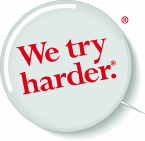 All through the process I was aware they were giving me special treatment. Probably because of the 33,000 followers I have on Twitter. Who knows, but they're aware this job will impact their online rep.
All through the process I was aware they were giving me special treatment. Probably because of the 33,000 followers I have on Twitter. Who knows, but they're aware this job will impact their online rep.
I'm going to wait until the move is over before saying who the company is. For some reason that seems the right way to go. But as I type this, in the bedroom of my old apartment, there's a moving guy behind me packing up the closet. In the other room, two guys are wrapping my sound system and TV and a couple of computers that didn't have boxes.
I feel pretty good about it. And of course I'm excited to be at the other end of the move in my new apartment, the east side, and next week, a better, symmetric net connection.
 Our civilization doesn't scale
Our civilization doesn't scale 
Stories about the latest banking crisis lead to an inevitable conclusion. There was no way to prepare for what was, in hindsight, inevitable -- the bursting of the housing bubble.
 Most of the hype from anti-government people are mashups of what President Reagan said to get elected, but had nothing to do with the way he governed. None of the things he said about government could actually work in the world he lived in, and would work even less in the world we live in today. But he didn't try to implement his ideas. He was a pretty normal politician that way. Sure wasn't anything remotely like a prophet.
Most of the hype from anti-government people are mashups of what President Reagan said to get elected, but had nothing to do with the way he governed. None of the things he said about government could actually work in the world he lived in, and would work even less in the world we live in today. But he didn't try to implement his ideas. He was a pretty normal politician that way. Sure wasn't anything remotely like a prophet.
Honestly, our problem isn't government, it's the huge number of people on the planet, multiplied by the complexity of the lives we lead.
Reagan's imagery might have worked when we lived on a mostly unexplored planet, without computers, and our complex computer-managed systems. If you didn't like having neighbors, you could just pick up and go somewhere and be by yourself, rugged and individual, and get some peace and freedom. If that world ever existed, and I wonder if it really did, it sure doesn't exist today. Not if you want your kids to go to school, and get proper health care, and get on the Internet and listen to your iPod, etc etc. Sure it sounds nice in a commercial, but you're not actually going to do it, even if you could, and you probably (almost certainly) can't.
We're living on the edge now, and we could still tip over into the abyss. It might even happen soon. That's what we we have to worry about, not whether we can "get government out of our way."
We may be on the cusp of another 2008-type financial meltdown. Turns out the banks may not actually own the houses they've been foreclosing. Now we have no idea who owns the places we live in.
All of the problems we're dealing with stem from the complexity that computers have enabled, and the scale of our civilization, the enormous number of people living on the planet, and the lack of education, intelligence, competence of the people who are running it. They may dress nicer than us, but it turns out the people running the banks and government don't actually understand the systems any better than you or I. They've just figured out how to get paid millions of dollars for looking and sounding like they understand.
If you all of a sudden said it's a free-for-all, everyone do exactly what you want, well, if you had the power to say it, you never would. Because you'd look at the situation and realize that's more or less what's already going on. What we need, with the vast number of people leading enormously complex unsustainable lives, is more of a collective sense of where we're going and what we're doing, not less. Otherwise we have no clue what's waiting for us, but it probably isn't very good.
 People who say "government is never the answer"
People who say "government is never the answer" 
 I'm doing a back and forth with a guy on Twitter who says "government is never the answer." He asks me to name two things the government does well. That's the kind of thing his leaders ask themselves and they never come up with anything. But wait a minute, aren't these the same people who like the military? Who say we should always support the troops? Aren't soldiers government employees?
I'm doing a back and forth with a guy on Twitter who says "government is never the answer." He asks me to name two things the government does well. That's the kind of thing his leaders ask themselves and they never come up with anything. But wait a minute, aren't these the same people who like the military? Who say we should always support the troops? Aren't soldiers government employees?
They're also tough on crime. Three strikes you're out. Lock the door, throw away the key. So how does that work without government? Does Rush Limbaugh decide who's guilty? That would make an interesting movie, but not a world I'd like to live in. I doubt if Limbaugh would like it very much. It wouldn't be long before there was some dittohead on the radio saying how he's a tool of some conspiracy or other.
I named a few things I thought he'd have a hard time saying weren't pretty good.
1. The Interstate Highway System.
2. The moon mission.
3. World War II.
4. Medicare.
Who wants to grow old and worry about getting their ailments treated?
None of us could afford to build all the highways we want to drive on, or might want to drive on somedays. That's why we pool our resources and all of us chip in and make it happen. When we pool our resources, in the U.S. that's called "government."
Wasn't it cool when Neil Armstrong said "One small step for man.."
We needed to pull together to win World War II.
A lot of people have accepted a lot of hooey as fact because it feels good to think they get something the rest of us don't. But wait till you get sick and find out how the health care system actually works. You don't have a whole lot of freedom when you're fighting for your life. It's confusing and you get all kinds of advice, and all of a sudden you don't feel so strong and independent. Especially when you find out you need help just to survive. And it's bad enough if you have the money to pay for the treatment, but a lot of people don't. What then? Do we just turn our back? And how isn't that one of the "death panels" that you all talk about all the time? Who actually says the word "No you have to die" in your ideal system?
No matter what the system is, someone has to say that sometimes. And sometimes people are ready to hear it (my father was, for example) and sometimes they're not. It's a gut-wrenching situation, and not one to make light of, and not one to feel superior to anyone because of. Maybe you're lucky and you've never been there. But it's pretty certain you will be there some day. Or someone you love will. Then you might find yourself wishing your neighbors cared about you a bit more than you care about them.
 I want a server rack in a (small) box
I want a server rack in a (small) box 
 Tomorrow is moving day, and I'm moving to an apartment with FIOS. 25 megabits up and 25 megabits down. Welcome Davey to the 21st Century. Finally. So all of a sudden I'm thinking about what kinds of services I can run out of my apartment with my symmetrical Internet connection.
Tomorrow is moving day, and I'm moving to an apartment with FIOS. 25 megabits up and 25 megabits down. Welcome Davey to the 21st Century. Finally. So all of a sudden I'm thinking about what kinds of services I can run out of my apartment with my symmetrical Internet connection.
That's all well and good, but this is a NYC apartment, so it's small. That led me to this question -- what's the smallest computer you can buy that can run an off-the-shelf OS like Windows, Mac or Linux? And wouldn't it be great if you could buy a small box that had slots, and in each slot you could put a complete computer? The box would take care of power and there would be no ports, except for Ethernet, which would basically be the internal bus protocol for the box. One jack for Internet, one for power, and say up to 15 additional CPUs (the box would come with one CPU on board). Then I could have a small server farm running from a corner of my desk in my crowded Manhattan apartment with great Internet access.
Think of it as a fractional horsepower server rack...
I know I'm dreaming. No such thing exists. But what if!
 Eric Kidd's feedhose client, lots more news, faster!
Eric Kidd's feedhose client, lots more news, faster! 
The browser-based feedhose for the NYT was a hit.
Lots of people tried it out yesterday, and there were a lot of questions. Hopefully some of them will be answered by today's developments.
For an encore, we decided to add three big streams to the NYT stream:
1. AFP wire photos.
2. Tech news.
3. BBC World Edition.
4. NY Times. (As with yesterday's version.)
When you put the four sources together, it's hundreds of feeds, so the updates are pretty frequent, esp during the workday.
The tech sources weren't just thrown together either. I started with feeds Scoble follows on Twitter (but I went for their RSS feeds) and added some that I follow, and then watched TechMeme for a while to try to figure out who their big sources are. It's a pretty good mix, and it's really something to watch the stories roll through, like yesterday's notice of Apple's press conference next week. The result is something that flows much faster.
Leave the window open on your screen, esp if you have a second monitor as I do, to keep news flowing to your desktop 24 by 7.
Now it may be too much, quite possibly is -- that suggests other user interfaces -- maybe something like Checkbox News. The good news is that Eric has provided the source code, so you get to play too! ![]()
View the source on Eric's page. It's all right there. Can you make something that looks more beautiful? Neither Eric or I are good at fonts or colors, we're plumbing guys. Help us out by making something gorgeous out of this river. Post a link to your experiment in the comments below or send me a link via email. (Address is in the right sidebar on scripting.com.)
Amy Bellinger sees this becoming a widget.
And you can drop down a level, and access this mix through the feedhose, directly. Just add &name=mix to any of the commands I listed in the JSON post. For example:
http://hose.scripting.com/recent?count=5&name=mix
http://hose.scripting.com/recent?name=mix
http://hose.scripting.com/recent?format=json&name=mix
http://hose.scripting.com/?format=json&timeout=3&name=mix
One more thing, Eric's feedhose client now has a cool new url:
![]()
 Perfect 10 for Microsoft ad
Perfect 10 for Microsoft ad 
Really.
A few observations.
They should have started running these ads before their rollout. Would have made the Ballmer interviews go better.
The ad works because it says something we all feel about phones, even if sometimes we're the ones bumping into people. It's annoying when people walk around with their mind and eyes elsewhere.
You even see assholes riding their bikes at full speed reading their phone, hands totally off the handlebars. They aren't bike riders, they're missiles.
It also works because it doesn't mention the competition. It isn't about the competition. It's saying -- hey -- we've been paying attention, even though we haven't had a product you lust for, we know what's going on.
It answers the "Microsoft is clueless" challenge.
Of course it says nothing about the phone.
If the product sucks the ad is for naught. But you sort of suspect they wouldn't have gone to the trouble to create such an excellent ad for a shit product.
But that's not the first thing we need to know. We don't want to buy a phone from someone we don't admire. Apple made it about that. I bought a Droid because they had something Apple didn't -- macho and guts and freedom (or at least the promise of freedom) at a time when iPhones seemed wimpy and locked-up and unreliable. Now with the iPhone 4, Apple is selling luxury. And as always selling Apple.
Microsoft needs to tell us what we're buying when we buy Microsoft. They're beginning to say something here. We're buying someone who is like us. Patient but getting kind of fed up. Really.
Maybe their phone reflects reality. Or maybe that's really-ity. ![]()
Good work!
 Beautiful weekday bike ride
Beautiful weekday bike ride 
 The rain they were forecasting went away and today was a gloriously beautiful autumn day in NYC. Temp in the high 60s, light breeze, very light traffic on the trail. Virtually ideal biking conditions.
The rain they were forecasting went away and today was a gloriously beautiful autumn day in NYC. Temp in the high 60s, light breeze, very light traffic on the trail. Virtually ideal biking conditions.
I have a new bike meditation. I am not the fastest biker on the trail, I am the safest. I go through the dangerous intersections slowly and carefully. If, as I'm entering a major danger spot, I find myself behind a slow cyclist or two, I patiently fall in behind them. Sorry folks, but if someone is going down I'd rather it not be me. ![]()
The bike is holding up well.
The river looks glassy and sunny today.
A group of walkers comes by when I'm stopped at the turnaround point. One of them says, if you're walking next to the river, it's a river walk. Case closed! Said like a true New Yorker. I took a picture as they went by, along with a biker who was cursing them for taking up the whole path with their philosophizing.
The map shows that the ride was 52 minutes, 8.94 miles.
 Eric Kidd's feedhose client in Javascript
Eric Kidd's feedhose client in Javascript 
I love doing projects with Eric Kidd. We've never actually met face to face, but he helped enormously with XML-RPC and RSS when they were in their formative stages. Eric did the C implementation of XML-RPC. Really did it right and it stood the test of time.
 Well, we're playing tennis again. I hit the ball over the net, he hits it back, etc etc. In this game you try to give the other guy a clear shot, and he hits a line drive back to you. Nice hard hit, no spin, nothing up the sleeve.
Well, we're playing tennis again. I hit the ball over the net, he hits it back, etc etc. In this game you try to give the other guy a clear shot, and he hits a line drive back to you. Nice hard hit, no spin, nothing up the sleeve.
I've been working on a protocol called FeedHose. As input it takes RSS and Atom feeds, and on the other end, it produces a stream of items. The key new thing here is that you connect to it via a long-poll request. The server returns as soon as a new item is available. None of the usual polling, and none of the latency that comes with it. Truly realtime! And it freaking works. (Many thanks to all the people who pioneered long-polling before I started doing it. I'm standing on the shoulders of giants.)
It caught Eric's eye, and imagination, when JSON support went in.
So along comes Eric and he says: "I can make that scale."
He builds a node.js app, works at making it scale.
He thinks his app, which fits on as a sort of "nozzle" to my hose, can spray items at tens if not hundreds of thousands of clients. That's really fcuking cool. ![]()
The picture above illustrates the architecture. But the proof is in the use:
http://feedhose.randomhacks.net/
This is a demo system, but it's useful because it gives you the news from the NY Times, as it becomes available.
The goal is to get many of these hoses running, for all kinds of publications, and for new kinds (microblogs). The key point is that the updates flow in real time, yet there is no single central server. Want to build a decentralized network that works like Twitter? You this to make it work.
This is on the road to the decentralized news system of the future.
If you run a realtime news organization, let's look at making your feed technology reflect that timeliness. ![]()
 A hackathon I'd like to be part of
A hackathon I'd like to be part of 
 A few thoughts I jotted down as I was blueskying the idea of the perfect hackathon.
A few thoughts I jotted down as I was blueskying the idea of the perfect hackathon.
Not an everyone-show-up-and-work-on-isolated-stuff thing.
All projects would be related to some (possibly new) protocol or format.
A mail list or some other form of workgroup leading up to the event.
At some really nice and outdoorsy place, so we can go for walks and maybe swim. Fresh air is good for thinking.
I like to sleep. Make it two days not one. Maybe three. ![]()
No prizes or awards or judges. The reward will be the experience, and the collective work that's produced. The point of the hackathon is to work together. The only way we should compete at this event is to make the group brighter, happier and more productive. Happier is a big deal.
I have a list of people I'd like to hack with, but I realized it would not be cool to publish it while I'm just blueskying this.
No publicity but also no secrecy. Everything is on the record for attribution.
 ATNTFTP
ATNTFTP 
Excellent Rebooting the News podcast yesterday, with someone both Jay and I respect -- Saul Hansell, who runs the seed.com program at AOL.
He came to be a guest on the show because he argues with the podcast, at his home in suburban New York, while doing his laundry. A time-honored way to consume podcast content. I do it myself. I often feel like yelling back at the idiot on the MP3, only this time I happened to be the idiot! ![]()
Not that we have the power to hear anyone yelling back at us. Wish we did. Saul sent us an email suggesting he might be a good guest. When I said I welcomed the chance to argue with him, he got a bit squeamish, as if we wouldn't like each other after the show, or whatever. I thought to myself, what's become of us that we can't argue, even passionately, and learn something in the process and come away with even more respect for the person we're arguing with? That's the way it turned out. If you like a heated and passionate disagreement, I highly recommend listening to RBTN #67.
As with all good disagreements, I thought of the real argument a few hours after it was over.
Before explaining, it's important to note that both Jay and I first met Hansell when he was a reporter for the NY Times. That's why, as often is the case, the discussion revolves around Times. Someday we'll figure out why the Times looms so large in all our discussions, but that's not what we discussed yesterday.
The crux of our disagreement is this.
I say that nothing appears on the pages of the NYT until a reporter at the Times has an epiphany about it. Saul says: "And isn't that what the Times is supposed to be?"
To which I resond: Emphatically, no. The Times is supposed to capture the events of our times. Hence its name. If it had been meant to capture the epiphanies of a few reporters, it might have been called "Our Epiphanies" and the motto might be "All the things that occur to us, when they occur to us, and not a moment before."
So I didn't say any of that, because I let Jay steer us into an idea I proposed to the Times in 2002, that they offer a Times-hosted site to anyone they quote, which of course is a tactic for achieving the kind of mix I was looking for and does nothing to explain why this is something they should have wanted to do. (BTW, to Jay who asked for a reference to this proposal, I found couple. Expand this paragraph on the scripting.com website for details.)
But to really nail it, consider that the motto of the Times is "All the news that's fit to print."
Which is so fundamental that it deserves an acronym: ATNTFTP.
It suggests a breadth of coverage. The first word isn't modest -- it isn't "some of the" or "most of the" or "a good cross-section of" -- it's "all."
Now this is why I find it so frustrating that the only new media ideas that appear on the op-ed pages of the Times are those that appear obvious to David Carr. Not that Carr isn't a very clever writer and speaker. He certainly is quite creative, but not in what's possible given the new distribution and authoring technologies, that have been developing for decades. But the limits he imposes on what the Times and can and can't do are far more restrictive than the mission the Times is on, ATNTFTP.
Because the Times has drifted so far from ATNTFTP, it can take ten years or more before a news-related idea that's actively being pursued by the tech industry to actually appear in the pages of the Times. This is not doing a service to anyone, certainly not to the members of the Times community who don't draw a paycheck from the Times, and probably not even to those who do.
Since the birth of the web, it's always been the next step for the Times to open the windows and let the fresh air in. They have a beautiful office, but the news isn't happening there, it's happening everywhere but there. Yet to read the Times you would think the opposite.
Now to the why of it. Why should the Times have aspired to be the all-inclusive place where people go to find out what's happening in the world, through the Internet. I think that the answer is self-evident. You can hear the tale of woe for the "news industry" on the op-ed page of the Times and every other newspaper. And on the business pages, and the technology pages. Even in politics and culture, the Internet is usurping the former role of the Paper of Record.
I think history has shown over and over, that you must rise to the challenge of new technology, or be marginalized by it.
You don't read about the demise of social networks on the social networks. Instead they have grown from a few million users just a couple of years ago to hundreds of millions of users today. They are beginning to exert the kind of political and cultural power that the Times used to. How do I know? I read about it in the Times.
As I said to Saul, I have a window on my desktop computer that scrolls the latest NY Times articles in realtime. I keep moving the technology and keep making offers to the Times. I see the value of what they do, but I want more of it, much more. I want their process to influence the processes of everyone else. But I'm losing that battle and I know it.
That is the point I keep trying to make: Let's work together.
 Short ride -- third day straight
Short ride -- third day straight 
The days are getting shorter, and I did a bunch of walking around NYC today. But as it started getting dark around 5:30PM, and with the forecast turning to rain for the next few days, I decided to squeeze in a half-ride.
The map. 31 minutes. 5.01 miles.
Up to 46th St and back.
Lots of riders, runners, bladers and pedestrians on the trail.
I need some bright clothing and lights on my bike.
Feeling gooood. ![]()
 Hackathons shouldn't just be corporate affairs
Hackathons shouldn't just be corporate affairs 
 Disclaimer: Hackathons are good, and the people who run them are great. This is not meant to reflect negatively on any of these fine events or people.
Disclaimer: Hackathons are good, and the people who run them are great. This is not meant to reflect negatively on any of these fine events or people.
At the start of a hackathon, there's a tradition of having people get up and pitch their APIs as possible starting points for projects. These are almost always corporate APIs.
But there are lots of formats and protocols that are created in open and non-commercial ways, and there are no corporations whose mission it is to promote them. As a result they are almost never pitched at hackathons, and hacks have a distinctive corporate flavor.
This is unfortunate because usually the most fertile APIs are the ones no one owns. The ones owned by corporations tend to have big missing bits of functionality that represent the corporate hope to have a business model.
So in the future, get some community people up their pitching from passion more than profit. It'll make your event even more interesting, in my humble opinion. ![]()
Bonus: A total of 11 ideas for hacks, all building on (or creating) open non-corporate APIs.
 Fixes to JSON support in FeedHose
Fixes to JSON support in FeedHose 
My JSON code is new, so there were a couple of problems.
1. I wasn't properly encoding double-quotes.
2. If a list had scalars it wasn't outputting them correctly.
Here's an example of a JSON query that caught both errors.
I've run it through JSONLint, and it says it's valid.
Thanks to Eric Kidd for both reports, perfectly documented.
![]()
 Stuck in Twitter, like the frog in boiling water
Stuck in Twitter, like the frog in boiling water 
I'm sure a lot of people would roll their eyes and shake their head when they read that Bob Woodward, a famous Washington political writer, said that he isn't on Twitter. "I'm not sure what it is," he said. "Part of my problem with the media is the impatience of speed which drives everything. As you know, I do long form. On Twitter, you can do 140 characters."
Amen brother! ![]()
 I mention this for tomorrow's Rebooting the News podcast, where I hope to discuss this with Jay as a follow-up to his comments, two weeks ago, about his disappointment that FriendFeed isn't keeping their system running. Actually disappointment is too mild a word. Jay is pissed. I said that it's his own damn fault for believing that FriendFeed was creating a service for him. They weren't. They were creating a service to serve their own purposes, whatever those may be. They never say, so we believe what we want to believe. But their lawyers make them tell the truth. They can do whatever they want, whenever they want for whatever reason, and they don't have to tell us. In other words, our interests and theirs are not very well aligned.
I mention this for tomorrow's Rebooting the News podcast, where I hope to discuss this with Jay as a follow-up to his comments, two weeks ago, about his disappointment that FriendFeed isn't keeping their system running. Actually disappointment is too mild a word. Jay is pissed. I said that it's his own damn fault for believing that FriendFeed was creating a service for him. They weren't. They were creating a service to serve their own purposes, whatever those may be. They never say, so we believe what we want to believe. But their lawyers make them tell the truth. They can do whatever they want, whenever they want for whatever reason, and they don't have to tell us. In other words, our interests and theirs are not very well aligned.
I cheered for Woodward the way an addict cheers for someone who was smart enough never to smoke the first cigarette, or take the first hit of coke or smack. I am stuck in Twitter, like the frog in the boiling water. I notice it's getting uncomfortable as they pull back features that were central to my adopting it in the first place. The ability to hack my own stuff in there. The level playing field where I could be as influential as the greatest media celebrity. The level playing field relative to Yahoo and Google and all the other Giants of the Valley. These are all lost, they were things I came to depend on, and now that they're gone, like my friend Jay -- I'm not happy. And as with Jay, it's my fault for believing, for no good reason, that things would more or less stay as they were.
 The only way to get what we want is to make the stuff work the way we want it to work. We can't wait for Silicon Valley to do that for us, because they will never do it. It's not in their nature.
The only way to get what we want is to make the stuff work the way we want it to work. We can't wait for Silicon Valley to do that for us, because they will never do it. It's not in their nature.
So mazel tov to Woodward. Keep your writing yours, and don't give it away so cheap.
And in the meantime, I keep looking for ways to get out of the predicament that I find myself in.
 The big 10/10/10 ride
The big 10/10/10 ride 
Today's ride was, just by accident (ooops bad word) a 10-mile ride.
On the big day: 10/10/10. ![]()
 Rode really carefully, esp entering the two dangerous intersections on the Hudson River Greenway bike path.
Rode really carefully, esp entering the two dangerous intersections on the Hudson River Greenway bike path.
It was super-cold at the start of the ride. Going to need some cold weather bike pants. Saw some people wearing them.
One of the great deals about riding when it's so cold, so early, is you pretty much have the road to yourself. By the end of the ride, the path was getting more jammed with suicidal riders using my lane as a passing lane, and walkers out for a stroll and oblivious to the fact that they were walking on a highway for wheeled vehicles going much faster than they are.
There was what appeared to be a serious accident on West St at Christopher. Didn't get very close to it, but they had the street closed off for 1/2 mile, and dozens of cop cars were there, lights flashing. Fire trucks too. (An aside, in this age of budding hyperlocal journalism, it seems I should be able to point you to a report saying what happened. We're not there yet.)
Anyway, after a brisk, 58-minute, 10-mile ride, I feel great. Pain is mostly gone. My legs feel strong and my body and soul feel exercised. Back in the saddle, again! ![]()
 15 days between rides
15 days between rides 
My last ride was on Sept 24. That was 15 days ago. Two weeks. And today I got back on the bike and took a slow ride down to the Battery, looked at the Statue of Liberty, turned around and came back.
A beautiful Saturday afternoon. Warm, in the low 70s. And every sidewalk stroller with a baby carriage was out, walking four-across. Oblivious to the wheeled traffic all around them. Numerous near-hits. Riding on-edge most of the time.
And the body aches. But it works. It was not agony and at times it was very satisfying. To have overcome the calamity and risen back on wheels, ready to climb the next hill!
The map. 4.93 miles in 39 minutes. Like I said, a slowwww ride. ![]()
 RSS data in JSON format
RSS data in JSON format 
This FeedHose thing is starting to get interesting!
1. There's a new page that shows the 3 most recent items to flow through the hose for the NYT.
http://hose.scripting.com/recent
2. You can change the number of items if you like. Max is 15.
http://hose.scripting.com/recent?count=5
3. You can get the most recent items in JSON.
http://hose.scripting.com/recent?format=json
It's worth pausing here. Look carefully. That's RSS data in JSON format. (I was not the first to do this, thankfully, I had prior art to look at. And a very nice validator to work with as well.)
4. You can also get the long-poll version in JSON, though it's harder to demo. You should call this from a loop in a script to test, or from a browser-based AJAX app. The call below will timeout after 3 seconds. The default is 180.
http://hose.scripting.com/?format=json&timeout=3
5. The seed page is also available in JSON. (I've got a general-purpose JSONizer inside the app.)
http://hose.scripting.com/seed?format=JSON
6. To celebrate all this neat jsonish hoseyness, I bought a cool domain to tie it all together (haven't started that part yet).
The open web is great, out here in wild.
Still diggin! ![]()
 May resume biking soooon
May resume biking soooon 
I got my front wheel fixed at Hudson Urban Bikes on Charles St in the West Village. This may signal my return to bike riding. Feeling strong and really missing the speed. After the crash on Sept 24.
When I was checking out there, with my longtime buddy Sandy WIlbourn, I happened to mention to the store person, Maggie, that I was a blogger. She said she was a J-school grad from NYU. Small world. Promised I'd put her pic on Scripting News.
At first Maggie presented her left cheek as her "good side" -- turns out her right side was injured by a car-door-opening accident. Beginning to get the idea that to be a bike rider in NYC is to ride with injuries. I know the feeling! My scabs are just about ready to fall off, but the bruises are still aching, from time to time.
Sandy was my college buddy from the math department at Tulane. Then he and I both went to UW-Madison. Finally a few years later I ran into him in Roberts Market in Woodside. Had drinks with him this eve in the meatpacking district. ![]()
 I have no idea what Ev is talking about
I have no idea what Ev is talking about 
Over on RWW, Marshall has a fascinating quote from Evan Williams.
"People have been talking about recreating Twitter as a set of standards and protocols pretty much since we launched and started getting popular. In fact these standards and protocols exist and Twitter is so open that people can just make Twitter work with a more open and federated network."
If such standards and protocols exist I don't know what they are.
What are they?
 4 more free ideas for your next hackathon
4 more free ideas for your next hackathon 
 This follows on the earlier 7 free project ideas piece, posted earlier today.
This follows on the earlier 7 free project ideas piece, posted earlier today.
8. I love Dropbox, but it's going to go down someday, and I don't know how to prepare for that. It's also a huge red bull's eye for hackers. It's wonderful, but like all good things, there comes a time when it must decentralize. Preparing for that day, we're going to need an open source Dropbox clone. It's a lot to do in a 24-hour hackathon, but you could get started, and possibly make something that's useful. It would be worth it just to find out what the issues are in implementing a multi-user file synchronizer.
9. Following on #8, we still haven't got drop-dead simple static hosting. But we're getting there, with Dropbox. I'd like to have a folder named Apache, and inside it are folders with the names of domains that I've mapped to a magic IP address. When a request comes in for that host, look in my Apache folder, if you find a match, serve the file from there. Yes, Dropbox already has a Public folder. That's why this can't be a commercial offering, Dropbox would squash it immediately. But it would be a killer add-on for an open source Dropbox clone.
 10. NYU is a great university, and there's a lot going on here, but no best place to go to find out what. Wouldn't it be great if every university had a fantastic news site, with a small number of feeds to go with it. Start with your campus and work out from there. Give us a great news site. I know it's not going to blow anyone away, but sometimes tech projects are just useful. And boring. ;-)
10. NYU is a great university, and there's a lot going on here, but no best place to go to find out what. Wouldn't it be great if every university had a fantastic news site, with a small number of feeds to go with it. Start with your campus and work out from there. Give us a great news site. I know it's not going to blow anyone away, but sometimes tech projects are just useful. And boring. ;-)
11. In the 1990's we used an web server called MacHTTP. It was configured with menus, dialogs, pop-ups. Almost anyone could figure it out. Fast-forward to today and MacHTTP is gone and we configure our web server with a weak, cryptic, confusing, ugly config file format. Come on, let's get our shit together and catch up to where were 15 years ago. Start a simple open source graphic user interface for Apache.
 7 free project ideas for an academic hackathon
7 free project ideas for an academic hackathon 
 Academic hackathons should have a different focus from VC-based ones. With VCs, the goal is to get your project funded, or to become more visible to VCs so that when they form new companies they might recommend you to the founders. A hackathon might be seen as a job interview, in a way.
Academic hackathons should have a different focus from VC-based ones. With VCs, the goal is to get your project funded, or to become more visible to VCs so that when they form new companies they might recommend you to the founders. A hackathon might be seen as a job interview, in a way.
An academic hackathon, like the ones held at Yahoo a number of years ago (where the concept originated), might be less like a job interview and more like a break from the usual work routine, to shake out new ideas or approaches. People who work or study in the same institution get together for an intense period to share. A chance to do collaborative experimentation. To try an idea out and see where it goes. See if you can't solve a problem that's part of someone else's work.
In 24 hours I wouldn't try for a breakthrough. But it is possible to focus for a few hours on a problem and come up with alternate approaches. Or to rework something that fell by the wayside in the past because of scaling issues perhaps. Or some piece of the puzzle was missing last time it was attempted, where a solution now exists.
Anyway, with that in mind, here are few ideas that you might try if you find yourself at an academic hackathon, such as the one this weekend at NYU. If anyone makes progress on these projects I will write them up on Scripting News, of course. ![]()
1. A few years ago I had a site called Share Your OPML. I had to take it offline because of scaling issues. The idea is that members of a community submit their OPML subscription lists to a central server. It mashes them together into a database and provides a number of readouts. It tells you what the most popular feeds are of course. But more important, it recommends feeds based on what other people are subscribed to. I think this project really could go somewhere. But this is where it starts. You can find SYO in archive.org's wayback machine.
2. How to display a River of News? Here's a bare-bones river. It's a relatively realtime view of the NY Times RSS feeds. For each item there's more metadata, but not much more. (The usual elements of an RSS item.) People say this display is plain and unexciting. They're right! But it looks good on a Blackberry. (I use an iPhone nowadays.) So it wouldn't bother me if it looked better and did a little more. But not a lot more. The simplicity of the River is central to its utility. Your mission, if you decide to accept it, is to prototype an HTML display of this river, perhaps with some prefs that a user can set, that is more beautiful. You might be able to do that in 12 hours or so. If you have an idea, maybe even less. ![]()
3. A project related to #2, write a client for the FeedHose protocol that I released last week. You can get the NY Times flow that way, without having to read the RSS feeds. That way your mockup will really work.
4. A really ambitious project that you could start at a hackathon is a centralized subscription manager. It would have a bookmarklet that installs in the browser, and would connect back to a server that manages subscription lists. Think of it as XMarks for feeds. Even the XMarks guys didn't realize how hot their own product is. This one is even hotter, if it can get support from people who do aggregators. Even if that never happens, it's still an interesting project to know how to do, just in case. ![]()
5. Hack status.net so users can edit the templates, producing a Twitter-like service that integrates with the look and feel of your site or blog. I would love to have one here on scripting.com, but not if it looks just like the status.net they operate in Montreal. I want mine to look like mine. Take the design features of Tumblr and apply them to Twitter. There's a big creative group that's been left out of the microblogging world, designers. Bring them in, lead them. For prior art look at how Tumblr does templates.
6. Readability is open source. Apple did some great stuff with it, as did (little-known fact) Flipboard. Instapaper is just getting going as a business. But these products get by by scraping. What if you created a high-level content platform that a blogging tool maker like myself could generate content for. What higher-level constructs would you implement? Could we get closer to Ted Nelson's vision for hypertext? (For extra credit, who is Ted Nelson and what is his vision of hypertext.)
7. I want to hack DNS. Implement a simple efficient REST interface for a domain name server. Let me add and delete records. Fully manage a domain via API. The API for DNS is ancient. Modernize it. (If your really focus and if you know how to program DNS, this could be a 12-hour project, imho.)
That's about it for now. If one or more of these ideas is done at the NYU Hackathon tomorrow, I'd be very happy! Let me know. ![]()
 What if Wes Anderson did the Zuckerberg movie?
What if Wes Anderson did the Zuckerberg movie? 
 Aaron Sorkin was an interesting choice, but what if the Zuckerberg movie had been more fanciful, like the Royal Tenenbaums? Bill Murray, Angelica Huston and Danny Glover play the lawyers. Young Luke Wilson to play Zuck and Owen Wilson to play his wacky sidekick Sean Parker. Gene Hackman would have made a great Harvard president! There would have been an opportunity for some fun dialog with the Winkelvii.
Aaron Sorkin was an interesting choice, but what if the Zuckerberg movie had been more fanciful, like the Royal Tenenbaums? Bill Murray, Angelica Huston and Danny Glover play the lawyers. Young Luke Wilson to play Zuck and Owen Wilson to play his wacky sidekick Sean Parker. Gene Hackman would have made a great Harvard president! There would have been an opportunity for some fun dialog with the Winkelvii.
There would have been a lot of songs, old Beatles and Beach Boys tunes, and Zuck would have had a real girlfriend who loved and nurtured him, instead of having one who was pissed off.
Maybe the Coen Brothers? You gotta know someone would have gotten murdered, maybe a lot of people, but it would have been fun anyway. Javier Bardem would play the gunslinging Zuck, with Steve Buscemi as his nincompoop sidekick. The Dude, played by Jeff Bridges, could do a walk-on, bathrobe and a milk carton.
Tim Burton! Now that would have been coool. Johnny Depp would be Zuck for sure, and the music would be by David Byrne Danny Elfman. Helena Bonham Carter as Zuck's girlfriend, and instead of being nurturing or angry she'd be on drugs, but would wear those cool dresses and dance a lot and generally be puzzled (in a nice way) by his nerdiness.
There are so many possibilities. Francis Ford Coppola, or his daughter Sophia. Martin Scorcese could direct Matt Damon and Leonardo DiCaprio in the leading roles. Matt could ask Leonardo how do you like them apples. And where was Scoble in all this? Obviously Philip Seymour Hoffman would play him. ![]()
There were so many ways to go, and maybe we can try them all. Zuck is only 26, and people love sequels!
 How to blow up a server in one mouse click
How to blow up a server in one mouse click 
Okay I think this is the second time I've done this.
Hopefully by writing it up as a blog post, I won't do it again. And perhaps there's some way out of this jam. I don't know. You tell me.
Anyway. I had this server, running fine. It's main purpose was to run a copy of River2, and serve as the aggregation engine for many of my experiments with RSS. It also is the cloud-end for the FeedHose experiments I've been running.
 Everything's going great. The server has lots of extra capacity. Just one problem. I can't get it on port 5337. This isn't usually something to worry about but I have an application that isn't working because of this. So I go poking around and find out that the Windows firewall isn't turned on.
Everything's going great. The server has lots of extra capacity. Just one problem. I can't get it on port 5337. This isn't usually something to worry about but I have an application that isn't working because of this. So I go poking around and find out that the Windows firewall isn't turned on.
The OS, Windows Server 2003, asks if I'd like to turn it on. There's a little warning message that I might have to restart the machine if something happens that I can't make heads or tails of. I think Geez restarting isn't such a big deal, so I click OK, and then my Remote Desktop session freezes.
At this point I realize what I've done.
I've now put up a firewall that prevents my remote desktop app from getting to the server. And this is a completely virtual machine, there's no keyboard, no big red switch, no physical reality with which to fix this. I think, if I'm not mistaken, I'm going to have to completely reprovision this baby. Could that possibly be. Yeah probably. ![]()
 Dropbox is down
Dropbox is down 
Every realtime system we depend on will go down at some point.
Today it's Dropbox's turn. We get to find out what it's like when the systems we've built on top of Dropbox stop working.
For example, http://east-village.org/ is not updating.
I forget if scripting.com depends on it. Guess I'll find out now. ![]()
PS: Apparently not. Whew!
 Panasonic's new camera is a phone!
Panasonic's new camera is a phone! 
Remember how I blasted Panasonic for saying if it has a ringtone it isn't a camera. How clueless.
And how deceptive. ![]()
Cause all along they were working on a high-end camera that communicates.
Now that's what I'm talkin about!!
Okay, I need to get one of these asap. ![]()
PS: It only works in Japan.
 Sammy's Roumanian Steak House
Sammy's Roumanian Steak House 
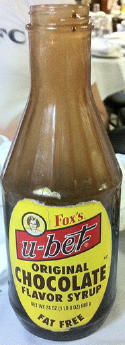 On Saturday night I went out to eat with Marc Canter and his son Aron at a world-famous restaurant in NYC, Sammy's Roumanian Steak House.
On Saturday night I went out to eat with Marc Canter and his son Aron at a world-famous restaurant in NYC, Sammy's Roumanian Steak House.
If you ever get a chance to eat out with Marc, I'd do it. Just kick back and let him work with the waiter. You always end up eating a perfectly orchestrated meal. And even though there aren't many choices at Sammy's, and I had been there many times over the years, this meal was a Canter orchestration par excellence, a new experience. Let me tell you what we had.
The meal started with glasses of ice cold seltzer and a big frozen bottle of vodka. The seltzer is very good, and while I'm not a big drinker of any kind of alcohol, this vodka, served at 32 degrees, tasted so good. I chugged a first glass, and then sipped it through the meal. It made the schmaltz of Sammy's work much better.
The next course, chopped liver. It comes in a steel bowl, with fried onions, garlic, and the waiter pours chicken fat over the whole thing and mixes it at your table. I know it sounds terrible, and it looks worse, oh but it is incredibly flavorful and delicious. For me it was the best course of the meal.
Then the waiter comes out with what he calls "monkey dicks" -- which are long sausages, I have no idea what's in them or what they're called, but they were also very good. You eat them with some pickles, onions and a bit of ketchup.
Then the main course, a huge piece of flank steak, grilled with lots of garlic and potato latkes on the side. Usually that would be the star of the meal for me, but the other flavors were so rich and the spices so great, esp in combination with the vodka. The main course seemed overwhelmed by the accessories.
Finally, a big bottle of Fox's U-bet and a half-gallon of milk and a fresh bottle of seltzer. Out of which you make your own egg creams. A New York tradition, which of course had no egg and no cream. ![]()
 Ryan Tate on Rebooting the News
Ryan Tate on Rebooting the News 
Gawker reporter Ryan Tate was our guest on Rebooting the News today.
 Cages for the ages
Cages for the ages 
New CEO at Twitter.

Media company of the future.

Hey hey we're the hamsters.

Wish a visionary..

Would tell us..

Where we fit in!

 The Zuckerberg movie is good for Zuckerberg
The Zuckerberg movie is good for Zuckerberg 
I reviewed The Social Network on Friday. I was so-so on it. Didn't think it was fair, didn't particularly like it as a movie.
 But as it settled in, one thing became clear -- it really raises the profile of Mark Zuckerberg to a prominent level. Raises him personally above the founders of every other current Silicon Valley high flier. This can't be anything but good for Zuck and his company, and bad for the others.
But as it settled in, one thing became clear -- it really raises the profile of Mark Zuckerberg to a prominent level. Raises him personally above the founders of every other current Silicon Valley high flier. This can't be anything but good for Zuck and his company, and bad for the others.
As Bill Gates puts himself out to pasture, as Steve Jobs is showing his bitter inflexibility, and Google looks more clueless about social networks all the time, there's Zuck, on screen, looking fresh and humbled by the birth experience of his company. But now the birthing is over, and even if people believe the myth that he's an asshole, so what? Did that really hurt his predecessors? Did anyone think Steve Jobs was lovable. Bill Gates? His role model was Mr Burns on The Simpsons. (And Sorkin tells us in the closing scene of the movie that Zuck isn't really an asshole (something we've already figured out) he just tries real hard to seem like one.)
All Zuck (the real one) has to do is show that he can take a joke or a jab and a little criticism and emerge with his sense of humor in tact, and he wins, big. And guess what, that's exactly what he's doing. Good work.
 Maybe NYU should be a startup?
Maybe NYU should be a startup? 
 Yesterday I posted an item saying I was looking for NYU's news feeds. I explained where I had looked. Enough time has passed by now that I would have expected a deluge. And one or two snide comments from people saying the main feed was in plain sight, how come I couldn't see it? But nothing like that came.
Yesterday I posted an item saying I was looking for NYU's news feeds. I explained where I had looked. Enough time has passed by now that I would have expected a deluge. And one or two snide comments from people saying the main feed was in plain sight, how come I couldn't see it? But nothing like that came.
This is Startup Week at NYU. A lot of professors and almuni will speak to students about the virtues of being an entrepreneur. But always the best way to inspire is by example. Tom Sawyer got a lot of help with his fence painting problem when he illustrated how much fun it was.
It seems to me that NYU could use an RSS-makeover. ![]()
How do the East Village bloggers, who seem to resent and fear NYU so, get their information on what the 800-pound gorilla is doing? Why aren't they screaming from the top of village tenements for the feeds.
What do we want? Feeds!! When do we want them? Now!! ![]()
This is how you achieve what they call transparency. By being up front with what's going on behind the curtain in the land of Oz.
Meanwhile in Startup-land, while everyone's lining up to the make the Foursquare for apartment rentals in Egypt, shouldn't we be taking care of our own online presence first?
And btw, where is NYU's Twitter feed? Lots of NYU departments have them, but the university itself, nowhere to be found.
 I'm looking for NYU's feeds
I'm looking for NYU's feeds 
I had a couple of hours this afternoon to play around, and thought I'd put a little time into finding some new feeds for the east-village.org aggregator. I thought it would make sense to add some news about NYU to the mix, and include news from NYU itself.
This led me to an interesting place. Either I can't find them, or NYU simply doesn't have feeds with news about NYU itself.
If you go to the home page, nyu.edu, you'll see that someone is adding news to it, keeping it current. There are items about Jon Stewart speaking at an NYU class. And the U.N. meeting in NY in September. A new study-abroad center opens and a new NYU bookstore on Broadway. Lots of other stuff. But no feeds?
 In searching I came across the NYU libraries. Often a good place to find news-related information. They have blogs (that's cool) and there are tutorials about RSS and podcasting, but again, no site-wide resource for news about the university.
In searching I came across the NYU libraries. Often a good place to find news-related information. They have blogs (that's cool) and there are tutorials about RSS and podcasting, but again, no site-wide resource for news about the university.
The NYU campus is unlike other campuses I've been on. Tulane has very definite boundaries, as does UW-Madison and Harvard. You always know when you're on campus or off-campus. But at NYU, even at the heart of what we think of as the campus, there's a huge public space, Washington Square Park that's not part of the university. And the campus itself is very dispersed, all over lower Manhattan. And it's growing.
Possibly this is why as I was a student growing up in New York, I was aware that there was an NYU, but if you asked me where it was, I couldn't have said. I even had family members who went to NYU.
So it kind of makes sense that it would be hard to find the central flow of the university's web presence. It's also why the university should over-compensate, do an especially good job of giving itself a recognizable center on the web.
I have some other ideas. One of the things I learned in my Harvard experience was to let the ideas out slowly, one at a time. And not expect to influence too much change. But another thing I learned from my Harvard experience is that there is a price to being too cautious and staying too much within the boundaries -- you miss things. While we were doing some nice stuff there in 2003 and 2004 at Berkman, I completely missed the Facebook bootstrap that was happening next door at the college.
If something like that is happening at NYU now, I want to be involved! ![]()
But the first step: let's find the pulse. And if we can't find it, help it become discoverable.
 Father's Day, revisited
Father's Day, revisited 
One year ago today was my father's last day on earth.
When people say other people were ready to die, I think there can only be a split decision. Who wouldn't want to go back to the sweet moments in life and live them again and again. And who doesn't have regrets, things they did they wish they hadn't. How differently things could have turned out.
And the mystery of it all. Who knows what bad things were avoided by good decisions?
A year later, there isn't a day I don't forget that my father is gone. But the feelings are further between.
You get a feeling over the years, that try as you may want it to change, it never does. Then boom, someone is gone and massive change happens.
In our family the change has all been for the better. I'm sort of sad to say that. A lot of deals had been made between family members that they won't do this if you don't do that. These are largely silent deals, not explicit. In many cases they were made before any of us were born, as each of us was molded to play a role that the others were comfortable with.
I may think of more things to add as the day goes by.
 Rebooting Computer Lib/Dream Machines
Rebooting Computer Lib/Dream Machines 
I've had the honor of emailing with Ted Nelson for the last week or so.
With my thinking mostly organized now it's time to write a blog post with the jist of what I've been wanting to say.
I've owned at least five copies of Computer Lib/Dream Machines. But I don't keep them very long. Inevitably, someone visits who I think needs to read the book, so I give it to them. A few years go by, and I come across another copy -- buy it -- and repeat.
 I recently did this, giving the book to a young colleague, Nicco Mele. I say young, but that's relative. Nicco is in his early 30s, is an adjunct professor at Harvard's Kennedy School, and should be teaching the stuff in Nelson's book. But get this. He had never read it, had never even heard of it. That's not the tragic part even. He didn't know what was in the book. This frustrates and scares me. Nicco is a guy who goes very far out of his way to be informed. That he doesn't know the roots of the creative side of computers, of the liberation side of computers, says everything. And someday he's going to write a book, and everyone is going to read it, and they're going to teach it in schools, but it won't be informed by what's in CL/DM.
I recently did this, giving the book to a young colleague, Nicco Mele. I say young, but that's relative. Nicco is in his early 30s, is an adjunct professor at Harvard's Kennedy School, and should be teaching the stuff in Nelson's book. But get this. He had never read it, had never even heard of it. That's not the tragic part even. He didn't know what was in the book. This frustrates and scares me. Nicco is a guy who goes very far out of his way to be informed. That he doesn't know the roots of the creative side of computers, of the liberation side of computers, says everything. And someday he's going to write a book, and everyone is going to read it, and they're going to teach it in schools, but it won't be informed by what's in CL/DM.
Nicco is also the founder of a tech consulting company, EchoDitto. He brought his copy of the book over to his engineers, and they took it from him. Bravo! But now he doesn't have a copy. (BTW, that's Nicco's wonderful son Asa in the margin of this piece. Think about him as you read on.)
So here's the thing.
1. The book is long out of print. The last revision, which no one likes, came from Microsoft Press in the mid-80s. The one before that went out of print in the 70s. I'm sure there weren't more than a few thousand printed.
2. If we could get our hands on a copy of the 70s book, and scan it, we couldn't upload it as a PDF (which is what I would like to see happen) because Ted doesn't want it to.
3. I've talked to a couple of book agents I know, asking if there's any hope of interesting a publisher in doing another edition of the book. I don't know how much thought they've given it, or who they've talked to, or if they even understood what I was talking about. But they said no.
4. I've thought of asking Ted to name a realistic number of dollars he'd like to earn from CL/DM in the next 20 years. And then ask, if we could get the money, would he let us scan the book and publish a PDF of it? The success people have had with Kickstarter these days makes me optimistic that we could get $50K or even as much as $75K this way.
5. Ted wrote a great book with some great thinking in it. But he doesn't love the web the way I do. I can't say he's wrong. But I have to stick to my beliefs. I think if a new publishing medium were to boot up now, it would have to emerge from the web, the way the web emerged from the Internet, and the Internet emerged from Unix, etc etc. There's a thread of development that's inexorable. That's why I feel intuitively that CL/DM belongs on the web. If for no other purpose than to illustrate how the web could be better. And because the printed medium does an inadequate job of representing the thoughts, and you can clearly see that from the way Nelson has set the book on paper, putting images of that paper on the Internet will make obvious the opportunity to collapse the paper into an electronic form. Also, there are now millions of programmers who know how to program networks. When Nelson wrote his book there were no more than hundreds. How much greater is the potential for achieving his vision of hypertext today than it was in the 70s? No comparison.
6. If we were to upload a PDF of the book, I would first get in touch with some of the best IP lawyers in the world, my former colleagues at Harvard Law School, and ask them to be sure that in publishing the book electronically, we were very clearly preserving the copyright, so that we could offer a print version of the book for a whatever price we thought appropriate. This PDF experiment could prove to a publisher that there's a market for the book. Or it could build a market for the print book.
I'm only interested in one thing here -- to preserve the ideas in Computer Lib/Dream Machines for another few generations. The work isn't done. They need to know where we came from. Anything that gets that done is great with me. The only unacceptable outcome is that the ideas continue to disappear from discourse among people working in this area.
 Let's do more computer science
Let's do more computer science 
 I watched quite a bit of the TechCrunch Disrupt conference this week. Mostly the presentations were by startups competing to win a prize. Judges commenting on them. The products were all cut from a small number of molds. Somehow they have fixated on turning the internet into a game. The hamsters, you and me, are rewarded for jumping through certain hoops. We enjoy playing this game so we buy things to indicate our pleasure. The people who sell the things kick back a few bucks to the folk who made the game.
I watched quite a bit of the TechCrunch Disrupt conference this week. Mostly the presentations were by startups competing to win a prize. Judges commenting on them. The products were all cut from a small number of molds. Somehow they have fixated on turning the internet into a game. The hamsters, you and me, are rewarded for jumping through certain hoops. We enjoy playing this game so we buy things to indicate our pleasure. The people who sell the things kick back a few bucks to the folk who made the game.
Reminds me of the time when the whole industry was fixated on pet food. Seriously. There was a moment.
But academic hackathons are imitating these crazy things. We put our programmers in a big room, feed them pizza and burritos and Jolt, and tell them to be brilliant for 24 hours. A lot of them will show up, especially after the Diaspora phenomenon on this campus last semester.
Since this is happening at a university, hopefully some of the projects will have scientific significance. If they don't I think we have failed as educators.
It's understandable that the commercial world gravitates toward deformities caused by the need to make a buck in a technology that wasn't really designed for making money. Recall that the initial Internet linked researchers at academic institutions. Try as hard we can, there are lots more applications in this area than the commercial ones. And the obvious commercial spots have been taken by the retail outlets and Amazon.
Now we're left to pick up the coins left on the ground after the people who pick up the coins left on the ground have come through. Funny thing is, if you got there first there were enough coins to get a $10 million cashout. But that's already happened. Now it's questionable whether there's actually any money left on the ground or on a table somewhere for the grabbing.
Instead I'd like to see, at a university hackathon, young computer science students get up and present to their teachers some new computer science. Some new use of graph theory. Or an old one re-applied to a modern world. We used to do that, when I was a comp sci grad student in the 1970s. I think we got way too caught up in the commercialism.
 Example: Here's a group of researchers at ten universities scattered around the world. They're collaborating on a presentation they will do at a conference in eight months. Most of the research is done, they just have to assemble it in a convincing way, while giving each contributor proper credit for their work. Here's a list of the current tools they are using. At this hackathon each group will create a tool that in some new way helps them collaborate. The projects will be judged strictly on utility, not eye-candy appeal.
Example: Here's a group of researchers at ten universities scattered around the world. They're collaborating on a presentation they will do at a conference in eight months. Most of the research is done, they just have to assemble it in a convincing way, while giving each contributor proper credit for their work. Here's a list of the current tools they are using. At this hackathon each group will create a tool that in some new way helps them collaborate. The projects will be judged strictly on utility, not eye-candy appeal.
Let's take the focus off what this stuff looks like to a judge, and start making computers work better in an academic environment. This may not immediately yield an angel-funding-event, but that shouldn't be our goal, should it? We're here teaching computer science, not how to convince a judge at TechCrunch that you have the next get-rich gizmo.
Don't worry though, eventually there will be money here. But we're all better at using the Internet than pitching venture capitalists, we all get a chance to have some fun, learn from each other, and actually accomplish something useful in the time we have together. And why should venture capitalists be the sole arbiters of what gets built? Isn't that at least part of the job of academia?
Where this is headed -- teaching people with computer science skills how to be creative. You can engineer creativity to a certain extent. And create environments where it's more likely. There is such a thing as a checklist for creativity.
But the hackathon format probably isn't the most conducive. But we can start there, since that's what we're doing.
 How hackathons work, part 2
How hackathons work, part 2 
I wrote a piece once asking how hackathons work.
Now I'm at a hackathon in Manhattan, and I'm making it work for me.
I came here with a project.
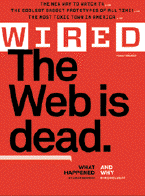 As you may know, I've been working on something called FeedHose, which does for feeds what the Twitter firehose does for tweetstreams.
As you may know, I've been working on something called FeedHose, which does for feeds what the Twitter firehose does for tweetstreams.
What comes out the other end of this bootstrap is a fast-updating River of News. Problem is I design some ugly rivers. Everyone says so. What I want is a beautiful river, without giving up the simplicity.
So I approached Jeremy Zilar who works at the Times, who hooked my East-Village river up to the LEV website. I said Jeremy wouldn't you like it if my river were a little prettier. So he introduced me to Jeff Marx, who works at the Journal-News. He's busily designing a new river format for us. "You might not like what I do," he says. True, I say. That's why I'm writing a blog post so you all can participate if you'd like. I'll have a pointer to Jeff's work soon.
And Jeremy is working on another project right now, but I expect to hijack him as well. And Matt Diaz. And Matt Terenzio. ![]()
Jeff has a first effort. "It's not much yet," he says.
But it's something -- I say! ![]()
 Review of The Social Network
Review of The Social Network 
 I waited to see the new Facebook movie until it was released, so I took off this afternoon and saw it at the Union Square multiplex along with a packed house of other rain-soaked New Yorkers.
I waited to see the new Facebook movie until it was released, so I took off this afternoon and saw it at the Union Square multiplex along with a packed house of other rain-soaked New Yorkers.
A few observations.
1. It's a very watchable movie, but what would you expect from Aaron Sorkin. It flowed like a double episode of The West Wing. Nothing as great as the best West Wing dialog, though.
2. It was probably too much to ask that the movie have the bite and wisdom and depth of The Fight Club, since both movies were directed by David Fincher. Fight Club was a great movie.
3. The Social Network is not a great movie, and despite what some people say, it will not make history or be remembered. I suppose it will win some awards.
4. Having lived the Silicon Valley lifestyle, I can say they got a tiny bit of it right, but most of it is a Hollywood fantasy.
5. I was at Harvard, believe it or not, when all this stuff was supposed to have taken place. It's more a testimony to how much I was not part of mainstream life at Harvard that I had no idea what was going on with Facebook. I didn't hear about it until I visited a campus in North Carolina.
6. I'd love to know what really happened with Eduardo, the other founder. I don't believe for a minute that Facebook's lawyers pulled such a fast one on him. They have no incentive to do it. And the Winkelvii didn't really have much of a case, again, if that's what really happened. All the stuff involving them made me think they were idiots. Not much drama there, not even much humor. (Lessig, a lawyer, is embarassed for the lawyers in his review of the movie.)
 7. I would have loved to have known more about Zuckerberg. He was of course the main, most interesting character. I don't think they got Sean Parker right. (I've met him, he's a pretty smart guy, nowhere near as simple as the character in the movie.)
7. I would have loved to have known more about Zuckerberg. He was of course the main, most interesting character. I don't think they got Sean Parker right. (I've met him, he's a pretty smart guy, nowhere near as simple as the character in the movie.)
8. Some parts of what they reported on were real enough. The programmers with headphones keeping the world from interfering, that's real. I'd love to see someone make a movie of Microserfs someday, though it would be a bit dated by now, that story capture the real experience of creative people in the tech world. Obviously what happens at Facebook (the real one) is interesting, but this movie wasn't very interesting or realistic.
9. Pity they didn't call it The Social Graph. ![]()




